- Search Please fill out this field.
- Newsletters
- Destinations
- More to Explore
- Where to Stay

18 Farmstays in India to Get Back to Nature
:max_bytes(150000):strip_icc():format(webp)/10947453_10153084623948270_8191342691038933499_o-591d1e8d3df78cf5fa731909.jpg)
Agriculture is the backbone of the Indian economy and agritourism is one of the latest concepts to revolutionize the India travel industry. Buoyed by the growing popularity of homestays in India, farmstays (essentially a homestay on a farm) are blossoming across the country. They provide an authentic and interactive experience of rural life, in the delightfully fresh country air. These farmstays are among the best in India and range from simple to sublime.
Dewalokam Farmstay Retreat, Karimannoor, Kerala
Dewalokam is the organic ancestral farm of a welcoming Syrian Christian family. The name means "paradise" and the property certainly is that! This faultless farmstay is conveniently located only 90 minutes drive from Kochi airport, in the spice belt of Kerala, bounded by a placid river and nature reserve. Fruit, vegetables, spices, milk, and honey are all produced there. An extensive range of activities is available for guests, including spice walks, village walks, bamboo rafting, temple visits, cow milking, and swimming. Or, simply chill in a hammock! Yoga, Ayurveda, and cooking holidays are also offered. The main guesthouse has eight spacious air-conditioned rooms overlooking the river and forest. There's also a private traditional house in the forest that has three bedrooms.
- Rates: 10,000 rupees per night for a double. All meals and most activities are included. Visit their website for more information.
Vanilla County, Kottayam Distict, Kerala
Another fabulous Kerala farmstay run by a Syrian Christian family, Vanilla County consists of a 70 year-old heritage bungalow on a 150 acre organic rubber and spice plantation. It's located two and a half hours drive from Kochi airport, near Vagamon in the lush Western Ghat mountain range. Guests can swim in natural rock pools, go on plantation walks, go trekking, birding, visit villages and a local meditation ashram, and cruise the Kerala backwaters . Up to four families can be accommodated in the main bungalow. The property is child-friendly and rooms are interconnected.
- Rates: Expect to pay 11,450 rupees per night for a double, with all meals and activities included. Without meals, the room rate is 7,250 rupees per night for a double. Visit their website for more information.
Maachli, Sindhudurg District, Maharashtra
Maachli is a divine farmstay, situated in Parule village on the far south Konkan Coast of Maharashtra. The closest beaches are Bhogwe and Tarkarli. The name "Maachli" means "elevated huts" in the local Malvani language. There are four architecturally designed hut-style accommodations on the property, built deep within nature among the Samant family's coconut, betel nut, banana and spice plantation. Everything revolves around nature, and there is a sweet water stream flowing through the property. Responsible tourism is also a strong focus. Activities include village walks, cooking lessons, farming experiences, trekking.
- Rates: 4,500 rupees per night for a double. Breakfast (200 rupees per person) and meals (500 rupees per person) are additional.
Dudhsagar Plantation and Farmstay, Goa
Had enough of beaches in Goa? How about heading inland to stay in the jungle instead? Dudhsagar Plantation is set on 50 lush acres and grows everything from pineapples to cashews. It also has its own cashew feni distillery, with production taking place from March to May each year (you can see it and of course try the feni). When the hosts purchased the land in 1985, there was no electricity or running water. They bathed from a well. Gradually, they built the plantation up to what it is today, and finally opened it as a farmstay with five jungle cottages for guests. The farmstay is located on the way to Goa’s famous Dudhsagar waterfall. However, it gets super crowded with hundred of tourist jeeps going there every day. Instead, you can trek to a little-known waterfall in the jungle. The farmstay’s stunning swimming pool is the perfect place to laze around if you don’t feel like doing anything. Otherwise, take a walk through the plantation and swim in a nearby sparkling river. Go in the monsoon season for a natural fish foot spa in the river!
- Rates: From around 3,500 rupees per night for a double, including breakfast.
Konyak Tea Retreat, Mon District, Nagaland
You may have heard of many of the popular places to visit tea plantations in India . However, this one in Nagaland , in India's Northeast region, is truly offbeat and remarkable! The host is the great granddaughter of a tattooed headhunter, and she's actively involved in researching and documenting the various tattoo patterns of her tribe. The boutique farmhouse is located in the middle of a remote, privately-owned 250-hectare tea estate. However, tea isn't all that's grown there. The farm also has an orange tree orchard and organic vegetable garden. Guests can pick and eat during harvesting season (mid-November to December). Other activities include milking cows and goats, working with locals in their paddy fields, going on nature hikes, learning how to traditionally smoke meat, and visiting local Konyak tribal villages. Do try the home-brewed rice beer too! The atmospheric stone-walled farmhouse is decorated with tribal paintings and has two guest rooms overlooking a valley.
- Rates : About 3,000 rupees per night for a double, including meals and a tour of the tea estate.
The Goat Village, Garhwal District, Uttarakhand
One of the best ways to experience rural India , Goat Village was set up by Green People as an initiative to augment local income and increase markets for organically-farmed products. Organic farming and agriculture are carried out on the property -- including the breeding of goats. The property offers purpose-built cottage accommodations with private bathrooms for guests. It's essentially run as a homestay, with villagers providing hospitality and cooking delicious regional cuisine. In addition to exploring the local way of life, guests can trek to nearby Nag Tibba mountain and go camping (all arrangements are taken care of). Reaching the village requires a trek of about an hour. The closest motorable village is Pantwari, a couple of hours from Mussoorie. Do note that electricity is minimal (just enough to charge phones). The Goat Village also has other properties in Uttarakhand.
- Rates: 7,000 rupees per night for a double, all inclusive. Dorm beds are available for 3,000 rupees per night, all inclusive.
Enchanted Forest Farm, near Gangtok, Sikkim
Enchanted Forest Farm is an 18-acre forest farmstay that could aptly be called a hidden gem. It's located in Ranka-Parbing village, 45 minutes from Gangtok , but you'll have to walk for about 15 minutes to reach it (there will be someone to carry your luggage). The tranquil setting, deep inside the forest with a waterfall, and delightful hosts are totally worth it though! The farm is completely organic and the property is pretty much self-sufficient. There's a fish pond, cows and goats. If you're a music lover, you're also in luck. The host plays guitar and loves a good jam session. Guest accommodations consist of three rustic yet elegant standalone cottages. You'll leave feeling so rejuvenated. Enchanting indeed!
- Rates: From about 2,500-5,000 rupees per night for a double, with breakfast included.
Destiny Farmstay, near Ooty, Tamil Nadu
Kids will love Destiny Farmstay! This expansive resort is secluded away about an hour from the popular hill station of Ooty. It has a stable full of horses, cows, sheep, rabbits, guinea pigs and geese. And, of course, farm dogs to watch over them. A huge range of produce is grown on the farm, including coffee, spices, fruit, vegetables, herbs and flowers. For the adults, there's a luxury spa, perfect for pampering and unwinding. Accommodations consist of 35 guest rooms. Zip-lining and day camping are additional experiences that are possible.
- Rates: Around 13,500 rupees upwards per night for a double, including breakfast and tax. Special packages are offered. It's on the pricier side for the facilities provided. Also, note that the approach road is not maintained and is in poor condition. The farmstay uses its own 4WD transport to ferry guests the last few miles.
Acres Wild Cheesemaking Farmstay, Coonoor, Tamil Nadu
Mansoor Khan is known as the man who quit Bollywood (he used to be a director) to make cheese. This inspiring 22-acre farmstay near Coonor is the result of him following his heart and reinventing himself. It's devoted to organic cheese-making and holistic, self-sustaining living. The farm has cows to provide the milk for its gourmet cheeses, and organic vegetables are grown as well. Guests can participate in a two-day gourmet artisan cheese-making course (cost 10,000 rupees per person plus tax). There are three guest cottages, named after types of cheeses, with a total of five rooms. Some walking up and down between the rooms and dining area is required, so do keep that in mind before booking.
- Rates: From 3,200-4,700 rupees per night for a double, plus tax. Breakfast is included. Additional meals are 400 rupees per person.
Oyster Opera, Kasaragod District, Kerala
This dreamy and inspiring eco-friendly farmstay in the northern part of Kerala is, as its name suggests, themed on oyster farming. The award-winning host was the first Indian to farm mussels on coir, and he educated local villagers (mostly women) about the use of this technology to uplift them and help improve their livelihoods. A group of these locals has also been trained to look after guests and act as guides. The property is perfect for those why want to spend some serene time by the Kerala backwaters . There are 10 traditional-style huts, all crafted from natural materials and named after various types of seafood. Some are floating and two are elevated on stilts. Facilities include swimming pool, kids playground, kayaks, and boat for exploring the surroundings.
- Rates: From 4,000 rupees per night for a double, including buffet meals (delicious Kerala cuisine) and activities.
Dwarka Farmstay, Sindhudurg District, Maharashtra
Dwarka is a bright and modern farmstay on a 15-acre orchard, also in Maharashtra's Sindhudurg district. It's located in Sawantwadi, approximately 30 minutes drive inland from unspoiled Vengurla beach. Mangoes, coconuts, cashews, and fruit are grown there. There's also a dairy on the property. Interesting activities are offered, such as a visit to a pottery village, bamboo workshop, and mat weaving. Various local sightseeing tours are arranged as well. The traditional Malvani cuisine served using farm-fresh ingredients is a highlight. There's also a swimming pool. The farmstay has nine double guest rooms, and a family room for a minimum of six people.
- Rates: From 2,800 rupees per night for a double. Packages with all meals included are offered.
Citrus County, Hoshiarpur, Punjab
Citrus County is one of the biggest success stories where farmstays in Punjab are concerned. The hosts started it in 2006 as a way to generate much needed additional income for their farm. The property is located on the way to Amritsar, and has three suites inside the house and nine luxury tents for glamping in the garden. It has been really thoughtfully developed and includes a swimming pool, cafe, and bar. As its name suggests, citrus fruit is farmed there in a 70 acre orchard. Guests can go fruit picking, travel by tractor through the fields, explore local villages, visit a dairy farm, learn various farming techniques, and cook Punjabi food.
- Rates: 14,000 rupees per night for a double, plus tax. It includes all meals and activities.
Prakriti Farms, Rupnagar, Punjab
Prakriti Farms is a non-profit organic farm, located around an hour from Chandigarh at the foothills of the Shivalik Range in Punjab. It's not far from the Ropar wetland and migrating birds can be seen flying over the property. The owners, alarmed by the surrounding disrespect for nature, are slowly recreating an ecological environment on the land inherited from their ancestors. Two types of accommodations are provided for guests -- cottages and tents. The safari tents have shared bathrooms, while the luxury Swiss tents have attached bathrooms. Activities include nature walks, trekking through the forest, and bird watching.
- Rates: Expect to pay about 5,000 rupees per night for a double cottage, including breakfast. Swiss tents are priced around 4,000 rupees per night. Prakriti Farms also accepts volunteers who want to learn and contribute to sustainable eco-farming practices. Visit their website for more information.
Tathagata Farm, Darjeeling, West Bengal
Tantalizing Tathagata Farm offers an opportunity to get back to nature on a tea estate up in the hills, 45 minutes from Darjeeling . In addition to tea, the farm grows cardamom, ginger, vegetables, oranges and other crops. Possible activities include plantation tours, trekking, nature trails and guided walks, fishing, picnicking and birding. Cottages and luxury tents with bathrooms are nestled among the greenery for guests to stay in.
- Rates: Around 5,700 rupees per night for a double cottage, with breakfast and dinner. Tents are about 6,400 rupees per night. Tax is included.
The Country Retreat Farmstay, Pali District, Rajasthan
The Country Retreat is a new boutique farm stay situated in the fields near Jawai, in Rajasthan's rural Pali district halfway between Jodhpur and Udaipur. The property comprises 130 acres of farmland and the host has vast agricultural knowledge. There are many possible activities including bird watching, animal herding, village and leopard safaris, cycling, photography, farm tours, farm activities, and complimentary Rajasthani cooking lessons. Guests are accommodated in four air-conditioned bedrooms, all attractively refurbished and decorated with regal touches.
- Rates: Expect to pay around 6,000 rupees per night upwards for a double, including breakfast. Visit their website for more information.
1515 Mepra: The Hidden Roots, Kuttanad District, Kerala
If you want to explore traditional Kerala village-style living, 1515 Mepra is the place! This 500 year-old farm is made up of a beautifully furnished heritage house, a fish farm, duck farm, gardens rich in Ayurvedic herbs, and rice, pepper, kokum, banana, and coconut plantations. The property is located in what's known as the "rice bowl region of Kerala". It's 45 minutes from Alleppey, an hour from Kumarakom, and a bit over 2 hours from Kochi airport. Activities include boating, fishing, village walks, temple and church visits, and Ayurvedic massages. There are four guest rooms, each connecting to the garden and accessed through the main courtyard.
- Rates: 3,000-5,500 rupees per night, including breakfast and tax, depending on the time of year.
Tieedi Earthy Dwelling, near Darjeeling, West Bengal
Are you interested in seeing and experiencing permaculture farming in action? A few years ago, the hosts at Tieedi quit their corporate careers and used regenerative permaculture principals to revive a forest and create a sustainable way of living for themselves. They built an amazing minimalist earth dwelling share it with guests (and have since added a herb garden dwelling and backpacker hostel). They also offer a Cook and Dine Experience on a their farm, featuring traditional cooking methods and homegrown produce. The hosts take guests on a forest walk, introduce the concept of permaculture and Forganic farming (foraging and organic farming), and show their outstanding composting process that upcycles the waste generated by the local village. There's heaps to learn, thanks to the diverse team of people with different skills sets who work and volunteer at the property . Go there to reconnect with nature and nourish your soul.
- Rates: From about 5,000 rupees per night for a double in the earthy dwelling, 1,500 rupees per night in the herb garden dwelling, and 650 rupees per night in the hostel.
Farm of Happiness, Ratnagiri District, Maharashtra
Farm of Happiness
Guests certainly have a lot to be happy about at this idyllic 20 acre organic farmstay, tucked away in a remote agricultural village that's largely untouched by modernization. A passionate couple from Mumbai set it up to introduce people to the concept of natural farming and teach them about the food they eat. You'll be encouraged to participate in the farming process to get an understand of how crops such as paddy, mangoes, and jackfruit are grown. Other possible activities include bullock cart rides, trekking, bird-watching, star gazing and fishing. The farmhouse has three earthy yet modern guest rooms with ethnic features such as clay floors and old-style furniture.
- Rates: 5,000 rupees per night for a double including meals (authentic local cuisine), farm tour, and star gazing. A minimum two night stay is required.
Related Articles
More related articles.

What is Agrotourism ? Agrotourism in India
- January 23, 2024
- Agribusiness

Hello everyone, I’m excited to come up with something unique for your upcoming adventures: Agrotourism. While the concept might be new to some, it’s all about experiencing the peaceful beauty of rural life firsthand. Explore trees laden with ripe fruits swaying gently in the breeze and fertile lands nurtured by welcoming farmers.
While traveling across villages, we can see bright sun with birds in the sky, greenery trees with a bunch of fruits, farmers working on the fields, cattle grazing in farms, and children playing traditional games. We all enjoyed this scenery once in our life, but do you think is this possible? yes, it is possible. Everyone can experience this dream like moment through Agrotourism. Yeah, agrotourism paves the way to relax and enjoy nature’s gifts. We can find the answer to what agriculture is, through exploring, what is agrotourism? Come on, let’s spend 5 minutes enjoying village life through this journey.
What is Agrotourism?
What is agrotourism? Here is the answer in one sentence, It is an innovative concept that merges Agriculture and Tourism. Agrotourism is also called Agritourism, Farmtourism and Agriculture Tourism. It encompasses a wide range of activities like Farm visits, educational programs, Farming activities, and more, aiming to uplift farmers economic conditions while offering visitors an immersive experience in rural life and agriculture, filled with enjoyment and entertainment
Agrotourism in India?
In India, agriculture plays a pivotal role in the economy. In recent times., farmers have been struggling to secure fair market prices for their agricultural produce. Many states in India practicing Agrotourism include Maharashtra, Kerala, Gujarat, Karnataka, Punjab, Haryana, and Nagaland. Agrotourism is a significant solution to this issue. The Agrotourism market in India exhibited a remarkable growth rate (CAGR) of 19.9% between 2023 and 2028.
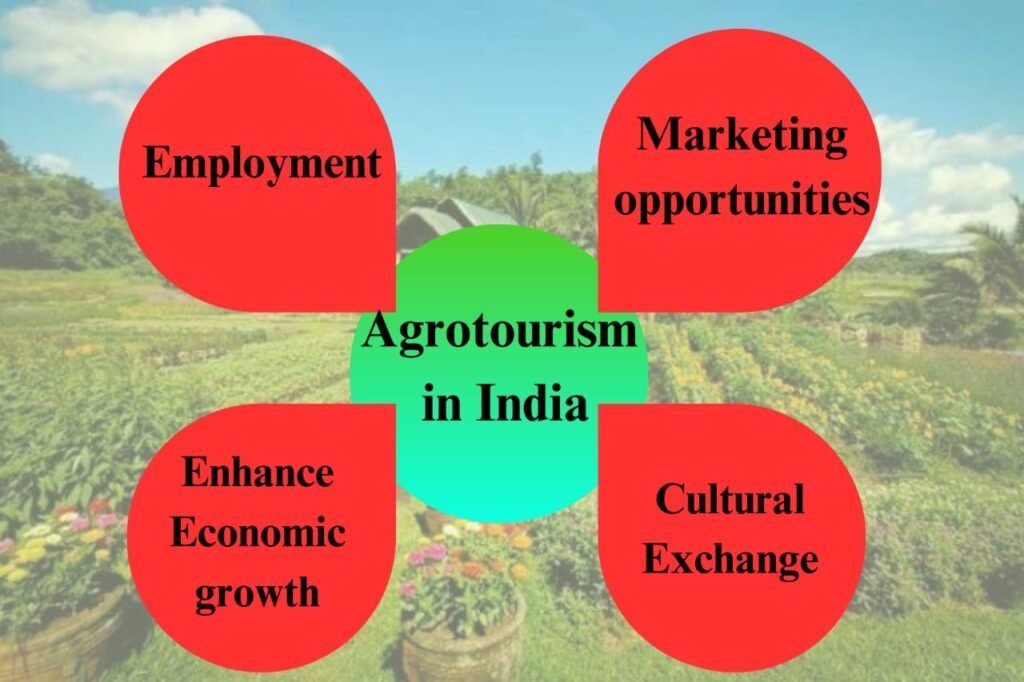
- Kisan Drone Scheme: Report on Advantages, Cost, Subsidy, Companies
- Earn up to 3 lakhs in 3 months through Tulsi Farming
Types of Activities in Agritourism in India
Many of us doubt What is agrotourism ? What is agrotourism place , What is agrotourism in India, What activities they offer, and how entertaining it can be. Is it possible to transform a village into a tourist spot? Millions of doubts can be cleared by knowing the possibilities. Let’s start exploring to clear up all these doubts!
Direct Marketing
Hospitality and farm stays, recreation activities, events and festivals, interactive learnings, demos and showcases.
![agro tourism destination in india Types of activities in agrotourism [What is agrotourism]](https://timesofagriculture.in/wp-content/uploads/2024/01/WhatsApp-Image-2024-01-11-at-11.50.31-PM-1024x682.jpeg)
In this generation, people are drawn to organic products, value-added items, and innovative offerings. Stalls showcasing unique products such as natural farm vegetables, handmade goods, cotton fabric clothes, native seeds, nurseries, and homemade dishes are featured in Agrotourism. This not only enhances their marketing linkages but also entertains visitors.
Agrotourism offers visitors the chance to stay on farms, immersing themselves in nature’s essence. Farm stays, equipped with all necessary facilities, entice visitors to indulge in an extended Agrotourism experience within the village. This allows visitors to explore and visit farms, and observe the process of sowing and growing crops, Let’s plan a farm stay with the family!
Agritourism boasts a variety of recreational activities such as hunting, fishing, horseback trail riding, reminiscent of carefree childhood days, offering a reprieve from sorrows. Engaging in painting, archery, enjoying tree swings, admiring scenery, playing traditional games, practicing photography, interacting with pets, and participating in u-pick produce activities are among the various options available in Agritourism to spend quality time. These recreational pursuits are a means to refresh ourselves and create memorable experiences
Villages, naturally adorned with ponds, farms, and various charming places, are undoubtedly ideal for trips and tours. Exploring mushroom farms, observing honey bee colonies, varieties of crop cultivation, ponds with aquatics, dairy farms, wells, mountain crops, heritage buildings, ancient temples, and historical sites offer unforgettable experiences.You can capture countless moments through photography to cherish for a lifetime. There are numerous spots waiting to be explored near these villages during trips and tours during Agrotourism.
While vacations often entail parties, festivals hold a special place in our celebrations. These events gather crowds with numerous competitions, traditional games, sharing cultural histories, showcasing traditional dances and foods, dramas, and shows. In rural areas, these festivals are celebrated with great fervour. Among these celebrations, harvest festivals are one of the most enjoyable experiences in Agrotourism
Through agrotourism. people get hands-on learning, understanding everything from planting seeds to food processing, offering practical agricultural knowledge. When we go on vacations elsewhere, we miss out on enjoying our own natural wonders. . Despite modern agricultural tech, this encourages visitors to consider business in farming, sparking entrepreneurial interest.
Many school students, college students, and researchers visit agritourism sites to gain practical knowledge in agriculture and related fields. Nowadays, people, especially youngsters, lack awareness of how farmers work and how food is cultivated from the soil. It’s an opportune moment to shift our focus towards understanding our culture and the principles underlying agricultural practices. Agritourism offers invaluable knowledge and experiences, with farmers sharing insights that aid in further research and agricultural advancements.
![agro tourism destination in india What is agrotourism? [ What is agrotourism ]](https://timesofagriculture.in/wp-content/uploads/2024/01/WhatsApp-Image-2024-01-13-at-9.26.55-PM-1024x675.jpeg)
The Agrotourism Development Corporation (ATDC)
The Agritourism Development Corporation (ATDC) Founded in 2005 by Shri Pandurang Taware, Father of Agri Tourism Concept, India, aims to elevate farmers’ incomes, establish crucial market linkages for their produce, and expand opportunities through agribusiness. Acknowledging its innovative approach, ATDC received the National Tourism Award in 2008 from the Tourism Department of the Government of India for its outstanding tourism product.
Maharashtra Tourism Development Corporation is the governing body of tourism in Maharashtra. They promote various tourism projects. Maharashtra proudly stands as the pioneer state in India to implement the Agrotourism policy, benefiting numerous farmers and drawing a significant number of foreign tourists.
Objectives of ATDC
- To create jobs, raise income for farmers, expand markets, and offer on-farm work, reducing the need to move to cities.
- It aims to boost Agrotourism through projects and training, helping rural economies growth
- To spread awareness about local farm products.
- To support rural livelihoods and traditional arts and music.
- 15 Innovative Small Farm Business Ideas for Amazing Profits
- Modern Tools Used in Agriculture to Protect Crop from Damage
Requirements to set up Agrotourism
Individual farmers, Agricultural cooperative societies, Farmer companies, and Agricultural research institutes can register to set up Agrotourism centers.Certificate issued upon registration completion. They should have Land of 2 to 5 acres with accommodation facilities, a Village equipped with transportation amenities, and Agricultural land showcasing a variety of crops.
Best Agrotourism Places in India
Nisarg sangit agrotourism.
It’s time to back our culture, help our farmers, and value what nature gives us. Nisarg Sangit Agrotourism, in Morgaon, Maharashtra, is a favorite spot in India for loads of activities like bullock cart rides, farm experiences, Fishing point and able to see traditional farming equipments. In this agro tourism, visitors will explore different types of farms including Goat farms, poultry farms and organic farms. It gives hands-on business opportunities through village tours. It’s great for family outings and friends’ hangouts.
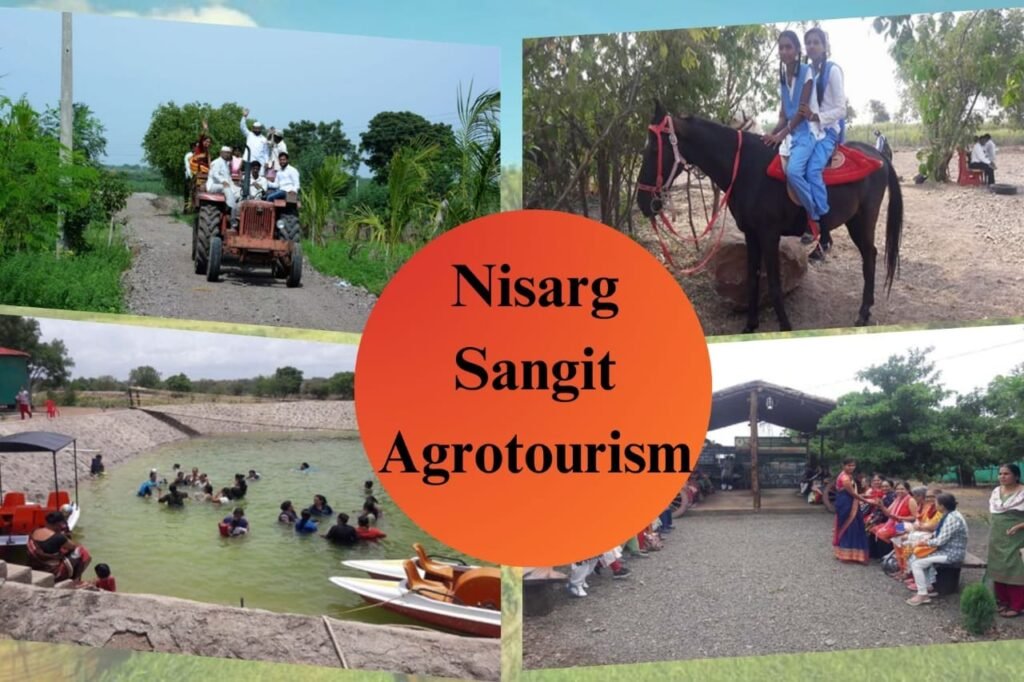
Tathagata Farm
In our stressful lives, Tethagata Farm could serve as a much-needed source of relief and relaxation. Tethagata Farms in Darjeeling, West Bengal, is a beautiful place with lots of trees . It’s perfect for family time to enjoy different types of activities available in their farms, include day trek to hills, village walk, Fishing and picnic, Cooking classes, Tea picking experience, Tea tasting experience.
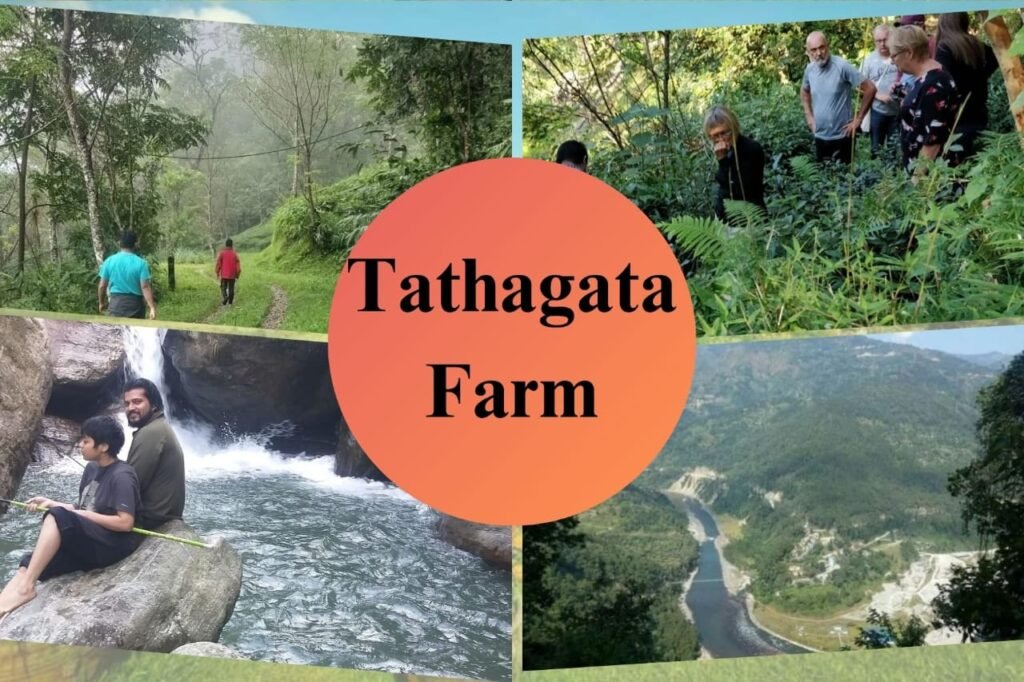
Maachli Farms
Maachli Farms in Parule, Maharashtra, is one of the best farm stays in India.It is located in Maharashtra, here you can enjoy plantation tours, exploring grasslands, and pottery experiences. The area was surrounded by coconut and betel nut trees. It’s a beautiful way to step back in time and experience the nostalgia of days gone by with Maachli Farms.

Harvest Fresh Farm
The most beautiful agrotourism spot in India is Harvest Fresh Farm. It is a lavish organic farm located in the Thekkady. Moreover, the farm offers a 360-degree mountain view, cycling around the valley, feeding ducks, and numerous other enjoyable experiences! Highlights include a bullock cart ride to the organic farms where pomegranates, papayas, grapes, mangoes, sapotas, tender coconuts, and apiary-producing honey can be found. Engaging activities such as feeding ducks and hens evoke nostalgic childhood moments.

Prakriti Farms
Are you curious about organic farms? Then consider visiting this versatile Prakriti farms in Punjab. The climate here is fantastic year-round, offering an awesome experience. It’s among the best farm stays where you can enjoy organic farming and nature’s pleasantness. You’ll feed the birds, try your hands on pottery that provide a wonderful ambiance.
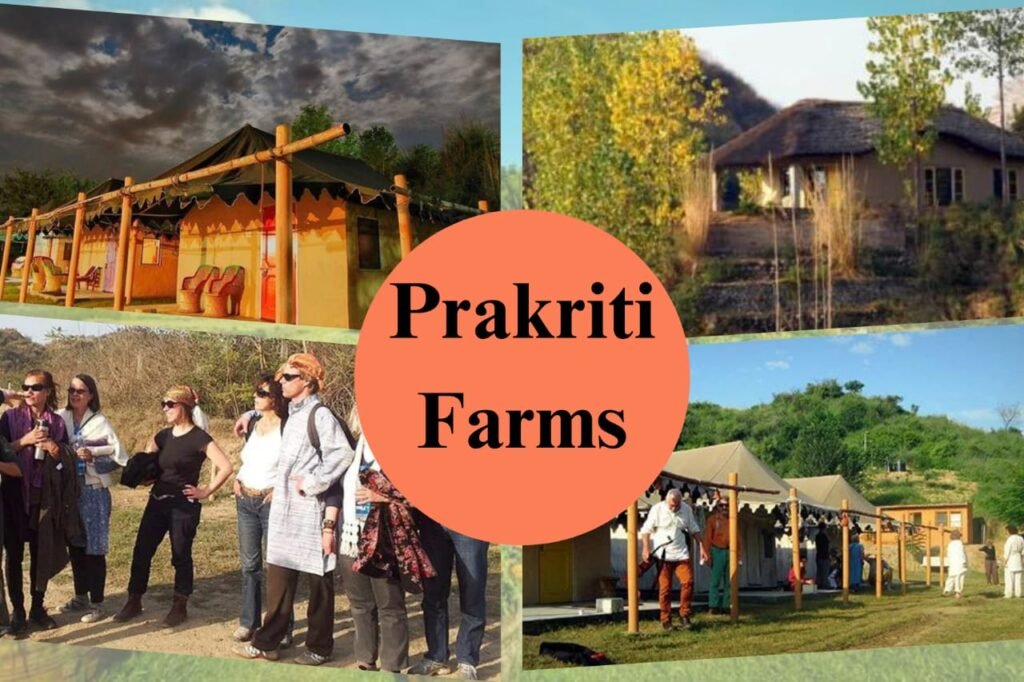
Farm of Happiness
Farm of Happiness is one of the best agrotourism destinations located in Maharashtra. Let’s explore the variety of activities available on this trip: morning walks through the farm, visits to yummy Alphonso and cashew nut farms, engaging farm activities, trekking, fishing, bullock cart rides, bird watching, and stargazing. Pack up for your next incredible trip to the farm of happiness and other activities await you on this farm stay.
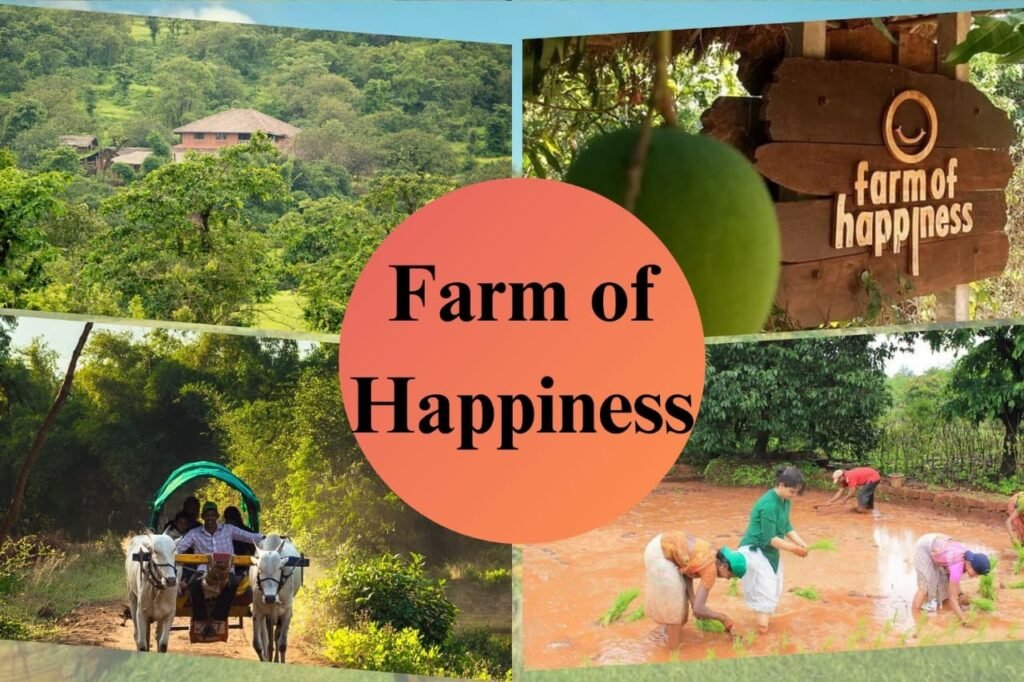
Dudhsagar Plantation
Dudhsagar Plantation, situated in Karmane village, Goa, is a major attraction for agrotourism in India. Surrounded by various species of birds, and farms to explore. Tourists can relish the natural organic farms varieties of crops. many activities include Bird watching, Nature trail, Neighborhood walk, Spice tour. Explore surrounding villages, rivers, various spice and fruits. Around 60 species of birds, makes a best spot for photography. It’s an ideal tourist spot for families to spend quality time together!
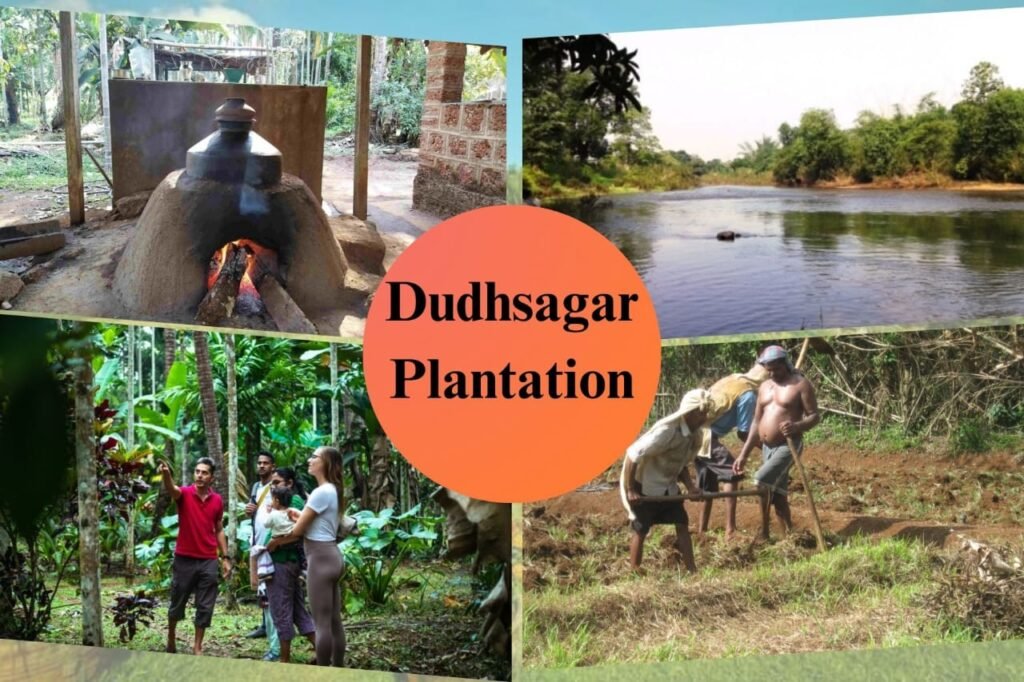
Velanga Orchard
Velanga Orchard is one of the best agrotourism destinations in India. It offers interesting pottery activities aimed at learning about our culture. Visitors can also purchase coconut oil and mango pickles directly from the farm. Are there any other equally exciting experiences in the world?”Other activities include motorcycle rides, hiking up the hill, walks through dense shrub forests, evening bonfires, and enjoying the natural environment.

Dewalokam Farmstay is in Kerala. Let’s check out the various activities in agrotourism in India. You can do a spice walk, bamboo rafting, forest walk, visit schools, milk cows, see rubber processing, and learn about organic farming. What else do you need for a peaceful life? Experience village life here completely!
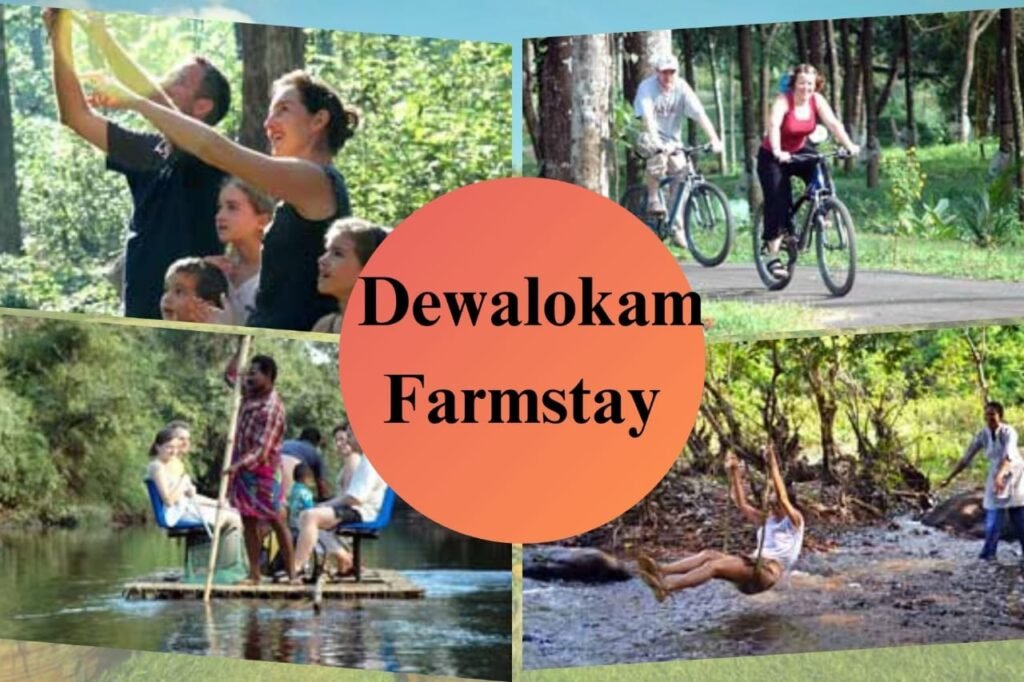
Konyak Tea Retreat
Konyak Tea Retreat is one of the oldest and most picturesque farmstays in Nagaland, India. It’s an eco-friendly farm offering numerous adventures. It’s regarded as one of the finest agrotourism experiences in India. Ready to give it a try? Walk through the tea and coffee plantations, pick oranges from the trees at the orchards, Hangout in the village in the evenings sipping rice beer, Stars gazing. lets you explore the local culture.
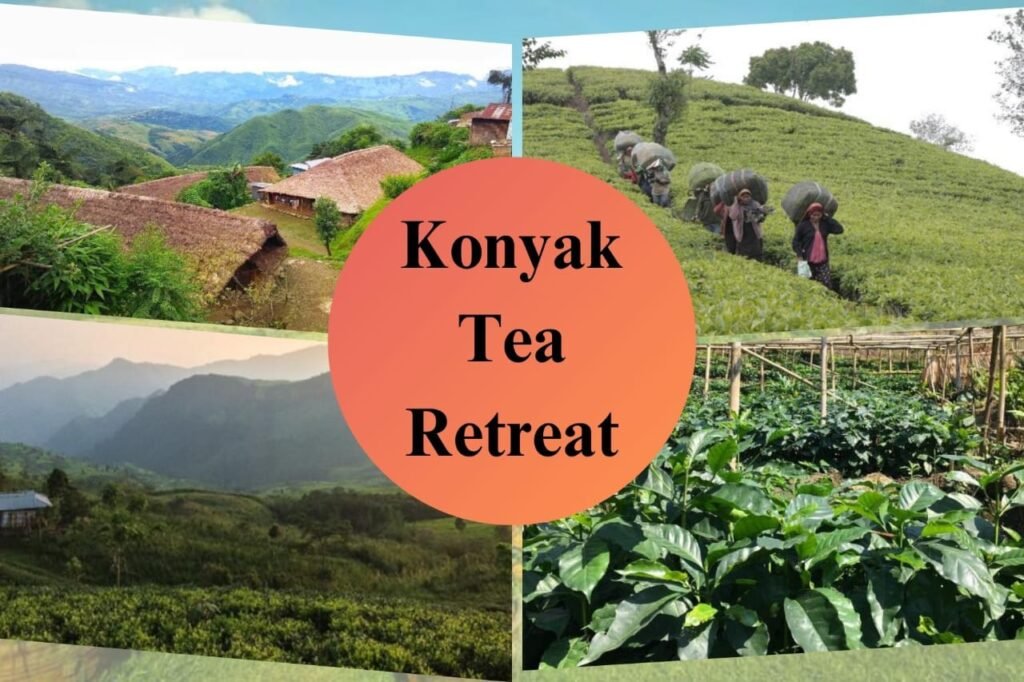
List of Various Agrotourism Places in India
Why agrotourism is important in india.
- Increase farmer’s income through farm stays and various other activities.
- Attracts a huge number of tourists, and helps to create marketing linkages worldwide.
- Increase the product sales of their agricultural produce throughout the year.
- Create employment opportunities for women and locals
- Educate young minds to be involved in agriculture and allied sectors
- It increases tourist visits, thus providing great support to the tourist department of the country.
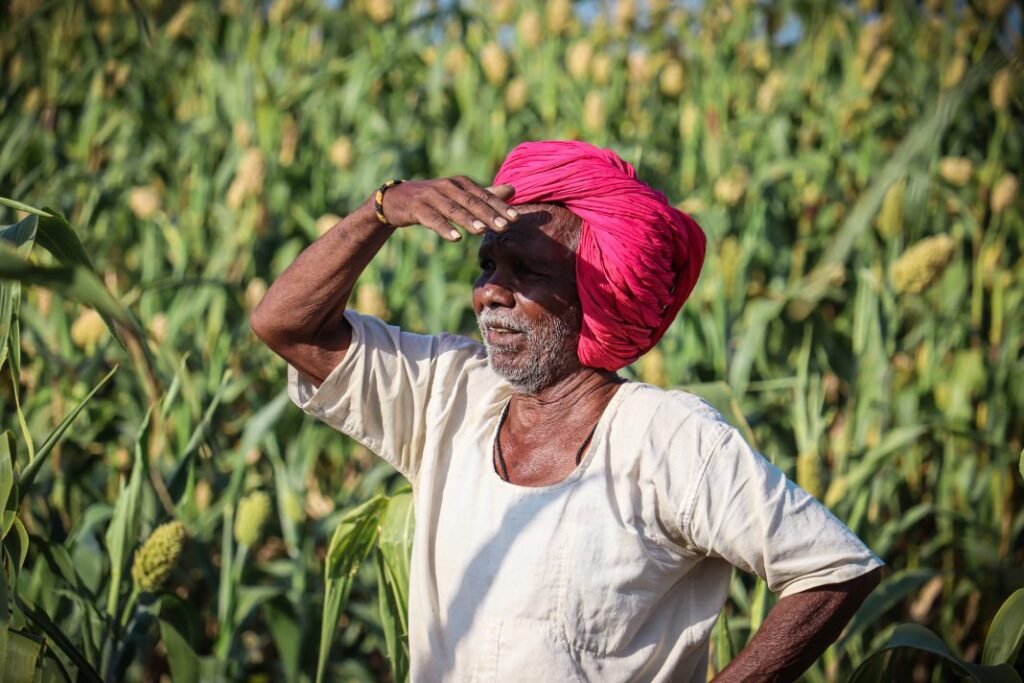
- Hoovu Fresh: New Floral Start-up with 8 Cr turnover
- How makhana is made | Latest Makhana farming in India
Challenges in Agrotourism in India
- Insufficient infrastructure, including road and accommodation facilities.
- Inadequate marketing strategies for direct sales.
- High initial setup expenses
- Communication barriers and language differences between tourists and farmers.
- Unsuitable climatic conditions and village locations for Agrotourism.
- Limited awareness about Agrotourism among farmers.
Agrotourism is a natural stress buster.. Even kids and adults can enjoy the activities of agrotourism. We are spending lot of money on vacations and tours for relaxation and enjoyment. Amid various technological advancements, this unique agrotourism concept holds a special place in the heart. Let’s share the concept of agrotourism with our loved ones and try it once. In this journey, we explore: What is agrotourism? And what is an agrotourism place? Etc. By experiencing these types of things, we can help our farmers , support our culture and traditions.
Latest Post

Jeya Bharathi
I am Jeya Bharathi, passionate about cultivating a healthier world through organic farming. As a curious explorer of agriculture, I'm always eager to learn and share insights. Let's connect through my agricultural articles and grow together!

Read Articles
copyright @timesofagriculture 2024


- Feeds Login
- English हिंदी मराठी ਪੰਜਾਬੀ தமிழ் മലയാളം বাংলা ಕನ್ನಡ ଓଡିଆ অসমীয়া ગુજરાતી తెలుగు
- MFOI Awards
- Weather News
- Profitable Business Ideas
- Latest Jobs
- More Topics

- Health & Lifestyle
- Success Stories
- Agriculture World
- Industry News
- Product Launches
- Commodity News
- Farm Mechanization
- Animal Husbandry
- Photo Gallery
- FTB Stories
- Agriculture Dictionary
- Web Stories
Subscribe to our print & digital magazines now
We're social. Connect with us on:
- Crop Calendar
- Subsidies from Government

Agri-Tourism: Sustainable Livelihood Through Rural Farm-Based Tourism in India
Agro-tourism, a lesser-known category within agriculture, is gaining momentum as people seek a slower pace of living and connection with rural areas. Farmers offer accommodation and curated experiences, benefiting both tourists and farmers.

While agriculture has not garnered enough limelight, agri-tourism becoming a matter of conversation and has been spreading to different parts of the country. And there's a reason why this is slowly gaining momentum. With the ever-increasing urbanization and the general trend of living in cities, people are growing increasingly tired of city life.
And when they look for a release, they are often looking towards- the rural parts of the country where they experience a slower pace of living and restore their own energy and stamina.
This is where agro-tourism factors in. Farmers have started offering accommodation to tourists in rural areas, offering them a curated experience of what it might be like to live in rural India. This benefits both the tourist experiencing the hospitality and the farmer. For the farmer, this can be a viable source of income during the tourist season and for the visitor, it offers the social advantage of getting in touch with their roots after isolation in the fast-paced city life.
The conversation regarding agrotourism has greatly increased after a Maharashtra farmer, Mr. Pandurang Taware was featured on Shark Tank India. Mr. Taware who is also known as the father of agro-tourism in India has been instrumental in popularising agro-tourism and encouraging more farmers to adopt the same.
Here are some ways in which farm-based tourism can promote sustainable livelihoods in rural India:
Income diversification : By hosting tourists, farmers can generate revenue through accommodation, food, guided tours, and participation in farming activities. This income diversification helps in reducing dependence on fluctuating agricultural incomes and provides a more stable livelihood option.

ICAR Sponsored Agro-Tourism Trips Planned for College Students
College students will have now the option to tour agricultural colleges as part of a unique activity. The Association of…
Job creation: It requires a range of services such as hospitality, catering, guiding, transportation, and handicraft production. By creating jobs, farm-based tourism contributes to reducing rural unemployment and underemployment.
Value addition and market diversification: Farm-based tourism encourages farmers to add value to their agricultural produce. They can offer farm-fresh organic food, traditional cuisine, handicrafts, and other locally produced items to tourists. It also promotes the preservation of traditional knowledge and skills.
Capacity building and skill development: Engaging in farm-based tourism requires farmers and local communities to develop skills related to hospitality, customer service, communication, and tourism management. By acquiring new skills, farmers and rural residents become more capable of running successful tourism enterprises and managing visitor expectations.
Preservation of cultural heritage and traditions : It encourages farmers and rural communities to preserve their cultural identity, traditional practices, and indigenous knowledge. This preservation contributes to cultural conservation, pride, and a sense of identity among local communities.
Environmental conservation and sustainability: Farm-based tourism can be developed with a focus on sustainable practices and ecological conservation. Sustainable practices also attract tourists who are increasingly seeking authentic and eco-conscious experiences.
Community empowerment and social development : Community-based tourism models enable locals to have a stake in the tourism enterprise, fostering a sense of ownership and equitable distribution of benefits. This empowerment strengthens social cohesion, creates opportunities for social entrepreneurship, and supports community development projects.
Related Topics
Download Krishi Jagran Mobile App for more updates on the Latest Agriculture News , Agriculture Quiz , Crop Calendar , Jobs in Agriculture , and more.
Related Articles
- Ecotourism: A Modern Day Travel Philosophy
- UP Tourism Department Partners with Homestays to Boost Rural Travel Experience
- Russian Tourists Clean Fort Kochi Beach in Kerala
- World Tourism Day Special: Discover the Marvels of Travel
- Agri-Tourism in India: Why is it Called Beneficial, Economical, Sustainable Agriculture Practise?
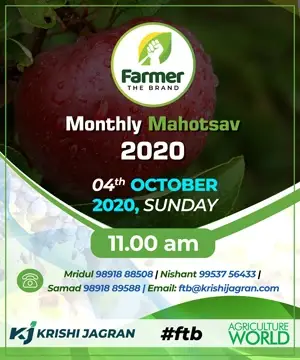
Top Stories
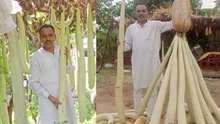
Madhya Pradesh Farmer Grows 7-Foot-Long Bottle Gourd, Earns Rs 30 Lakh Annually

Household Spending on Food Drops Below 50% for First Time Since 1947: EAC-PM Report

Ganesh Chaturthi 2024: Top 5 Things You Should Never Do for a Blessed Celebration

Andhra Floods Damage 1.8 lakh ha of Crops, Affecting Nearly 2 Lakh Farmers

Ganesh Chaturthi 2024: Embracing Sustainability for a Greener Celebration
We're on WhatsApp! Join our WhatsApp group and get the most important updates you need. Daily.
Subscribe to our Newsletter. You choose the topics of your interest and we'll send you handpicked news and latest updates based on your choice.

Latest feeds
Pm kisan scheme: bjp’s manifesto promises to give rs 10,000 to j&k farmers, exploring the potential of semaglutide peptide in adipose tissue, icar-cirb develops urine-based pregnancy test for ruminants, signs mou for further advancement, biofortified maize varieties: a nutritious, sustainable, and profitable choice for farmers, adani green energy and totalenergies form $444m jv for world's largest solar project in gujarat, pau partners with rk millet delight to promote millet-based snacks and instant foods, nrlm supports 90 lakh shg families in livestock sector; trains 1.3 lakh pashusakhis, ssc gd constable recruitment 2025: applications open for 39,481 vacancies - here's the direct link to apply.
- Destinations

Exploring Agriculture Tourism in India and Its Benefits
Agricultural tourism involves visitors partaking in farming-related activities, engaging themselves in rural life, and relishing agricultural events. This distinct kind of tourism has grown in popularity in India because of its potential to provide tourists with an immersive and informative experience while also contributing to the economic development of rural areas.
Table of Contents
Here, you will discover agro-rural tourism and its numerous benefits.
What is Agricultural Tourism or Agro-Rural Tourism?
Agro-rural tourism encompasses a wide range of activities that connect tourists with rural life and agricultural practices. These activities include farm visits, fruit and veggie picking, planting and harvesting, learning about traditional agricultural processes, and sampling local food. The primary goal of agro-rural tourism is to give tourists a close-up view of the land of agriculture and the lifestyles of rural dwellers.
Benefits of Agro-Rural Tourism
Economic boost to rural areas: .
Agro-rural tourism injects revenue directly into rural economies. Farmers and local communities can generate income by offering guided tours, selling fresh produce, handicrafts, and providing accommodation options. This economic diversification reduces the dependency solely on agriculture and can contribute to poverty reduction.
Preservation of Cultural Heritage:
This form of tourism helps preserve indigenous traditions, farming techniques, and local cultures. Visitors gain insights into the rich cultural heritage of rural communities, fostering appreciation and respect for their way of life. If you are planning a trip soon, then book Indian Eagle tickets to enjoy a budget-friendly trip.
Educational and Awareness Facility:
Agro-rural tourism serves as an educational platform, promoting awareness about the importance of sustainable agriculture, biodiversity, and environmental conservation. Visitors acquire a better understanding of the challenges and opportunities that farmers and rural communities face.
Urban-Rural Bridge:
Agro-rural tourism eliminates the gaps between urban and rural inhabitants. Urban visitors get a chance to disconnect from city life and experience the tranquility of rural settings, while rural inhabitants gain exposure to different cultures and lifestyles through interactions with tourists.
Enhanced Agricultural Practices:
Through interactions with tourists, farmers can learn about innovative farming techniques, market demands, and consumer preferences. This knowledge exchange can lead to improved agricultural practices and increased productivity.
Mutual Understanding and Cultural Exchange:
Tourists and local communities benefit from cross-cultural exchanges and mutual understanding through agro-rural tourism. This can lead to cultural exchange, breaking down stereotypes, and promoting tolerance and harmony.
Agro-rural tourism is a symbiotic relationship that benefits both tourists and rural communities. While tourists gain memorable and educational experiences, rural areas receive economic support, cultural preservation, and sustainable development opportunities. As India continues to embrace this form of tourism, it has the potential to uplift rural livelihoods and create a more interconnected and culturally enriched society.
Agro-Rural Tourism presents a win-win scenario. Travelers get to escape the chaos of urban life, immerse themselves in the beauty of rural landscapes, and learn about sustainable agricultural practices. Meanwhile, rural communities benefit from economic opportunities and heightened cultural exchange.
If you’re searching for an exciting and revitalizing travel journey, Agro-Rural Tourism in India deserves to be at the top of your list. Traveling from USA to India? Indian Eagle offers low-cost flights, making your trip both reasonable and memorable.
RELATED ARTICLES MORE FROM AUTHOR
Why You Should Book Air India SFO to Bangalore Direct Flights
5 Stunning Las Vegas Beach Destinations You Can’t Miss
Top Things to Do in Kolkata to Make Your Trip Memorable
Explore How Flexible Flights Make Your Travel Affordable and Comfortable
Best Restaurants Near Denver Airport for a Quick Meal
8 Smart Air Travel Tips for a Comfortable Journey
Leave a reply cancel reply.
Save my name, email, and website in this browser for the next time I comment.
EVEN MORE NEWS
POPULAR CATEGORY
- travel 1042
- United States 311
- Airlines 154
- Destinations 111
- Hi, My Account Subscriptions --> My KT Trading Contact Us Privacy Notice Sign Out
Sat, Sep 07, 2024 | Rabi al-Awwal 4, 1446
Dubai 20°C
- Expo City Dubai
- Emergencies
- Ras Al Khaimah
- Umm Al Quwain
Life and Living
- Visa & Immigration in UAE
- Banking in UAE
- Schooling in UAE
- Housing in UAE
- Ramadan 2024
- Saudi Arabia
- Philippines
- Cryptocurrency
- Infrastructure
- Currency Exchange
- Horse Racing
- Local Sports
Entertainment
- Local Events
Dubai World Cup
- Track Notes
- Big Numbers
- Daily Updates
- Arts & Culture
- Mental Health
- Relationships
- Staycations
- UAE Attractions
- Tech Reviews
- Motoring Reviews
- Movie Reviews
- Book reviews
- Restaurant Reviews
- Young Times
- Supplements
- Back To School
- Eid-Al-Adha
- It’s Summer Time
- Leading Universities
- Higher Education
- India Real Estate Show
- Future Of Insurance
- KT Desert Drive
- New Age Finance & Accounting Summit
- Digital Health Forum
- Subscriptions
- UAE Holidays
- Latest News
- Prayer Timings
- Cinema Listings
- Inspired Living
- Advertise With Us
- Privacy Notice
KT APPDOWNLOAD

India Embraces Agri-Tourism: The New Trend in Experiential Travel
Explore how agri-tourism blends agriculture with adventure, offering unique insights into local culture and farming practices amidst breathtaking landscapes, by aftab husain kola.
- Follow us on

Top Stories

UAE announces 2-month grace period for residence visa violators

UAE announces fee refund for tax service charges from August 1

Paid parking in Dubai: Residents face up to Dh4,000 extra yearly costs when new rates kick in

Published: Thu 15 Aug 2024, 12:57 PM
Last updated: Fri 16 Aug 2024, 10:37 AM
I woke up to the melodious chirping of birds at Honey Pot Homes, a charming homestay nestled in Mercara, Coorg, Karnataka, renowned for its coffee and spices. Surrounded by lush, verdant plantations of coffee, spices, and fruit trees, I found myself immersed in the unhurried rhythms of rural life, ensconced in these picturesque surroundings.
Shamveel Nizam, the gracious host of Honey Pot Homes, recently guided a group of eager tourists through his verdant plantations. He passionately shares: "Here at Honey Pot Homes, guests can indulge in inhaling the crisp, fragrant air infused with the aroma of coffee. Picture relishing a meal composed of freshly harvested vegetables and enjoying freshly brewed coffee, meticulously crafted to tantalize the senses. What truly delights is the opportunity to hand-pick coffee, spices, and fruits, fostering an intimate connection with nature. It's a rare chance to witness the intricate workings of a bustling farm, to delve into farming processes, and to uncover the vibrant tapestry of local culture."
Agri-tourism, also known as farm tourism, is becoming increasingly popular among a new generation of tourists who seek to escape the stresses of modern life. This novel initiative has sparked significant enthusiasm within the tourism industry. It offers a unique blend that connects agricultural production and processing with tourism.

The global agri-tourism market achieved a valuation of $42.46 billion in 2019 and is anticipated to attain $62.98 billion by 2027, exhibiting a compound annual growth rate (CAGR) of 13.4 per cent from 2021 to 2027.
In India, approximately 141 million hectares of net sown area across diverse agro-climatic conditions provide a broad range of habitats. India, deeply rooted in its villages, is now poised to embrace agri-tourism, with states like Maharashtra, Karnataka, Kerala, and Tamil Nadu taking the lead.
Agri-tourism integrates agricultural production or processing with tourism, inviting visitors to farms, or other agricultural activities for entertainment, education, and income generation. In India, agri-tourism represents a promising niche tourism segment, providing unique experiences that blend rural charm with agricultural insights. Simply put, agri-tourism refers to a commercial practice that combines agricultural activities with tourism for the entertainment and recreation of tourists.
To promote such tourism initiatives, the Government of India has introduced a National Strategy for the Promotion of Rural Homestays — an initiative towards self-reliant rural areas (Atmanirbhar Bharat). This strategy includes guidelines for rural homestays, offering tourists accommodations for an authentic local experience and interaction with the local community. This opens up opportunities to explore new and undiscovered locations while gaining insights into rural village lifestyles up close and the importance of preserving agricultural heritage. Agritourism encompassed a wide range of activities and services, including lodging, food and beverage, events, festivals, nature contemplation, U-pick (harvest), educational and recreational trips, hunting, fishing, and the sale of goods.

Recognising the potential of these sectors, the Maharashtra Government has taken pioneering initiatives to promote them. In 2020, it came out with an agro-tourism policy aimed at reviving the tourism sector and providing support to the rural economy. Maharashtra has been leading the way in implementing and promoting agri-tourism, rural tourism, and sustainable tourism across the country. Pandurang Taware, an entrepreneur from a rural background, was instrumental in pioneering agritourism in India. In 2004, he established the Agritourism Development Corporation (ATDC) in Malegaon, Baramati, Maharashtra. This organisation is focused on advancing agritourism in Maharashtra, helping to broaden business opportunities and support sustainable livelihoods for farmers. Agri Tourism Development Corporation (ATDC) in India is pioneering Agriculture Tourism, extending beyond traditional tourism paradigms to rural communities. Starting with the inaugural initiative at Baramati Agri Tourism Trust, ATDC has grown to establish Agri Tourism Centers across locations like Palshiwadi Village and 700 other centres. This initiative has successfully drawn 8 million tourists, including 500,000 international guests from 20 countries. Maharashtra's berry basket region, including Mahabaleshwar and Panchgani, offers excellent opportunities for farm tourism. Many strawberry and wild berry farms invite visitors to pick their fruits, enhancing the experience.
The famous Sahyadri Farms in Maharashtra has carved out a niche in farm tourism by offering an immersive experience that connects visitors with the origins and challenges of their daily food.
Azhar Tambuwala, Director of Sahyadri Farms, Nashik, explains, “A visit to Sahyadri Farms offers an up-close view of the strength of a farmer collective and demonstrates how Indian farmers have collaborated to address their challenges, becoming a leading force both nationally and internationally. Beyond the joy of fruit picking, visitors gain insights into sustainable farming techniques, innovative practices, water conservation, controlled residue farming, waste management, and the cooperative model that empowers local farmers. Guided tours, interactive workshops, and hands-on activities make agro-tourism at Sahyadri Farms an enriching experience, fostering a deeper connection with nature and a better understanding of modern agriculture.”

Tamil Nadu's push for Agri-Tourism through horticulture farms
Tamil Nadu, known for its major crops such as rice, cotton, groundnut, mung bean, urd bean, and sugarcane, is actively advancing its agri-tourism initiatives. The state's Department of Horticulture and Plantation Crops manages 78 State Horticulture Farms spread across 35 districts. These farms serve as focal points for agri-tourism, offering visitors a diverse range of agricultural experiences.
Visitors to these farms can explore various agricultural environments, including coffee and tea plantations. They can also witness the cultivation of a wide array of crops such as potatoes, cabbages, carrots, and beans. Additionally, the farms showcase tropical fruits like durian, litchi, and rambutan, providing tourists with insights into Tamil Nadu's rich agricultural diversity. The inaugural Tamil Nadu Tourism Policy 2023 aims to transform the state's agricultural landscape into a vibrant tourism hub. It encourages owners of fruit orchards, tea estates, and diverse agricultural ventures to open their doors to visitors seeking firsthand experiences in farming practices. This initiative aims to educate tourists about crop cultivation, immerse them in the rustic charm of rural life, and foster a deeper appreciation for Tamil Nadu's agricultural heritage.
Additionally, the policy outlines forthcoming guidelines to support this initiative. It advocates specifically for tea and spice plantations to develop attractive experiential tours. These tours will include packaged stays and hands-on activities, offering tourists an immersive journey into the heart of Tamil Nadu's agricultural traditions. Through these innovative measures, the state aims not only to promote sustainable tourism but also to preserve and celebrate its agricultural legacy in a captivating and interactive manner. Tamil Nadu boasts several prominent agri-tourism and farm stay destinations, each offering unique experiences that highlight the state's diverse agricultural scenery. Hill stations like Valparai, Megamalai, the Nilgiris, Ooty, Coonoor, Yercaud, and Kodaikanal are renowned for their scenic tea, coffee, and spice plantations. These locations not only immerse visitors in agricultural activities but also provide accommodations amidst picturesque plantation settings.
In Pollachi, just 40km from Coimbatore, the landscape is dominated by coconut plantations, offering serene accommodation options nestled among towering coconut trees. This area is perfect for those seeking a peaceful farm stay experience.
Further north, the fertile village of Nallichery, situated 14 kilometres from Thanjavur, invites visitors to join guided agricultural tours. Exploring this rustic village, a testament to Indian culture and heritage, offers a five-hour journey into the heart of rural life and traditional farming practices.
Kerala: Farm fresh attractions
Agri-tourism is gaining momentum in Kerala, prompting farmers to cultivate vegetables, fruits, and flowers to leverage their produce as a draw for visitors. The Kerala Agri Tourism Network, launched as part of the renowned Responsible Tourism project in the state, aims to ensure that the agricultural community can economically benefit by integrating farming with tourism. Numerous farms and tea plantations throughout the state offer excellent accommodation options, enhancing the appeal of agricultural tourism experiences.
Karnataka has also decided to join the bandwagon by promoting agritourism. This initiative aims to introduce urbanites to various aspects of agriculture and rural life, thereby increasing farmers' incomes and boosting the tourism economy.
Speaking to Khaleej Times , Dr. Rajendra K.V., the newly appointed Director of the Department of Tourism, Karnataka, shared his visionary plans to elevate the region’s tourism landscape. With a renewed focus on the Karnataka Tourism Policy 2024-2029, Dr. Rajendra aims to weave agritourism into the fabric of the state’s tourism strategy.
“Agri-tourism will be a cornerstone of our revised Tourism Policy,” Dr. Rajendra stated. “Our aim is to not only highlight Karnataka’s agricultural and farming sectors but also to showcase the rich, rural life across the state. The plan includes several innovative elements: offering input subsidies to genuine farmers willing to join hands with the government in developing tourism infrastructure; creating a comprehensive database of homestays, resorts, staycations, and agritourism infrastructure for standardization and offering accreditation; and improving amenities such as telecom and road connectivity.”
The Karnataka tourism policy note highlights that promoting and developing agritourism encourages tourists to participate in agricultural and farming activities. It also serves as a gateway to local cuisine, culture, traditions, and arts, while providing agricultural education to school students.
Dr PM Sobarad, Additional Director of Farms and Nurseries at the Department of Horticulture, informed us that it will require some time to finalise the planning and establish basic infrastructure at the existing farms to entertain and educate visitors. The districts of Shivamogga, Coorg, and Chikmagalur in the Western Ghats provide a rustic holiday experience through engaging farm visits.
To promote agri-tourism effectively, India can explore various avenues, including diversifying live experiences, adopting sustainable practices, leveraging technology, and enhancing community engagement and government support. By fostering partnerships and improving promotional strategies, India can position itself as a premier destination for agri-tourism, benefiting local economies and preserving agricultural heritage.
— Aftab Husain Kola is a senior Indian journalist. He regularly contributes to Khaleej Times, Arab News, Al Arabiya Engligh (Dubai) and also served at Times of Oman and Saudi Gazette.
More news from Supplements
supplements
Revolutionising the UAE Payment Scheme
Network International — Leading the adoption of the Jaywan National Domestic Card Scheme, boosting financial inclusion and cost-efficiency for the UAE issuers and merchants
supplements 2 weeks ago -->
Foster growth seen for Indian fintech industry
Indian fintech landscape has been rapidly evolving, introducing innovative features that enhance the user experience and broaden financial inclusion
supplements 3 weeks ago -->
Celebrating the Essence of India
Taste India's vibrant street food and cultural essence as Soul of India celebrates Independence Day with festive dishes and heartfelt community connections
Condor Unveils Sonate Residences in JVT
Unveiling a new address of luxury with high-end amenities and exquisite lifestyle

Tale of Unbreakable Spirit and Kohli’s Nirvana
How history and heart defined the T20 World Cup Final
A Record-Breaking Olympics for the Indian Contingent
With six medals, including one silver and five bronze, Indian athletes delivered a stellar performance at Paris Olympics 2024, showcasing unparalleled skill and determination
Omaxe Announces the Launch of India's First Integrated Sports-Cum-Commercial Arena
The Omaxe State will be a 5-in-1 destination featuring a state-of-the-art cricket and football stadium and India’s first air-conditioned high street in New Delhi
Next-Gen ‘Vande Bharat’
India’s upcoming home-built bullet train set to revolutionise rail travel with speeds surpassing 250km/h
Type your keywords
Welcome to Aambaban
Agri tourism & adventure park, an exotic holiday destination near pune, just 45 km from pune a perfect blend of agri and rural tourism., hello nature lovers, we are aambaban.
It's a finest corner of nature which will surround you with beautiful natures sparkling. Here we provide not only rural but also perfect countryside experience with a purely Agritourism. Here we welcomes you along with our heart and always try for it could be remembering visit for you. We better known for four seasoned purely Agritourism, because we offer services and facilities as per season especially because in summer you experienced unforgettable nature like sprinkles, feel the natures rich and unforgettable climate in rainy season, you will love sizzling camp fire and memorable night outs a best holiday destinations near pune and picnic spot near Rajgurunagar (Tal.: Khed).
People Visted
Cups of teas, various plants, happy clients, what we are , aambaban is an agri tourism and adventure park located at distance of 45 mins from pune., rural games.
We welcome you with bunch of entertainment at Aambaban. Here you experienced not only in-door games but also out-door games also with this everybody could go into flashback because there are many interesting games are available like Vitti Dandu, Atya Patya, Sur Parambya, Kabaddi, Lapachapi, Marbles, Dori udya etc.
To get more excitement and enjoyment here we introduce you a facility of rain dance and feel be open in natural surroundings, we welcome you to experience this activity. Here you enjoy rain dance with your family, friends, colleagues within secure surroundings. We provide you a best facility to enjoy rain dance and it will be a memorable experience for you because it will help to give not only enjoyment but also relaxation also.
Bird Watching
Nature call is now rare in today’s fast lifestyle, here nature calls remains for bird calling. At Aambaban we introduce our new service that is bird watching.
Bullock Cart Ride
Here we welcome all of you with as Atithi Devo bhawa or guest is like god and we try to provide all facilities for we start agri tourism movement. The main reason of this is to give exposure to our farmers and rural life and one of most reason is introduce you with all corners of rural life and culture. Here you will find one of most fascinating part that is bullock cart riding, yes…! Real cart ride with unlimited fun and it will be experience finest experience ever.
Kids specially love to play in mud…wet mud in fact. For them, special arrangements of shower by sprinklers have been made; in which the kids as well as adults do enjoy a lot. They can get themselves cleaned in lake and return to the tents.
Recent Photos
We love what we do, check out some of latest photos, view more photos, welcome gate.
Agri Tourism
Enjoy the beauty of Nature with Singing Birds, Fresh Air.
Event celebration
Rural animals, village culture.
The arrangement was fantastic and the food quality was superb will defiantly visit again and again and also recommended others for visit. All the very best !!!
Fantastic, Ultimate place to Relax after all. Take time to live. Nature has too.... much to give !!!
Very good location and equally good service. The people here are very good and we appreciate their service & help.
Reach out for a inquiry or just say hello
Send us a message, contact info, where to find us.
Pabal Road, Kharpudi Bk., Khed Pune. 410 505
Phone: (+91) 91 12 26 73 40 Phone: (+91) 99 70 96 77 92

A Comprehensive Guide to Rise of Agro Tourism Sector in India
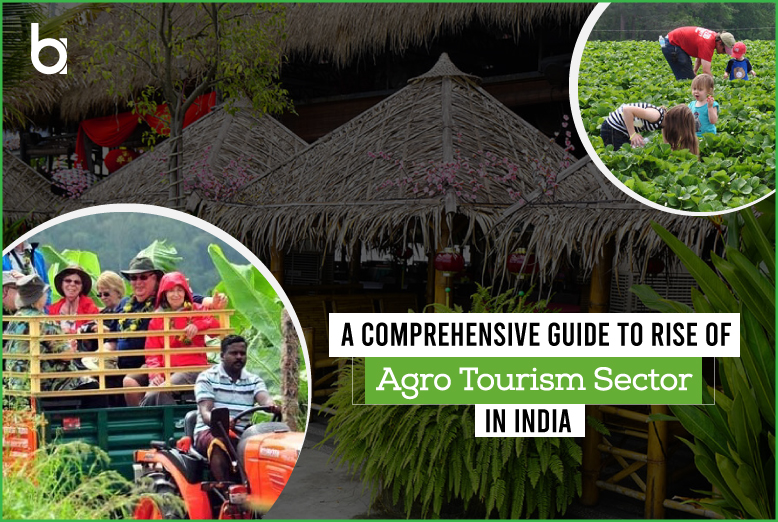
India is an incredible piece of land for foodies and travelers. Diverse in culture, landscape, and ethnicities, it has been a hotspot for tourists from all across the globe. From spiritual destinations to the most scenic terrain and shiny beaches, India has it all. As per the records, India catered to around 10.93 million foreign tourists in 2019. However, the COVID-19 pandemic brought the number down to 6.19 million in 2022. The rise is expected within the next couple of years. Thus, all governments are implementing new strategies to attract the largest number of domestic and foreign tourists. One such strategy is Agro Tourism.
What is Agro Tourism?
Agro tourism, or agritourism, involves visiting farms, agricultural areas, and rural landscapes. It is an immersive experience of farmland and participating in farming activities and rural life. It is a form of niche tourism that allows tourists to learn about agricultural practices, food production processes, and the rural way of life while enjoying recreational activities in the countryside. Agritourism destinations may include working farms, vineyards, orchards, ranches, and other agricultural settings.
Objectives of Agro Tourism
The primary objective of the agro-tourism sector is to provide tourists with an educational and entertaining experience. Furthermore, supports local farmers and rural communities by generating additional income and promoting sustainable agriculture and cultural exchange. Visitors to agritourism sites can often engage in activities such as picking fruits, vegetables, or grapes. In addition, they can participate in farm chores, take farm tours, and enjoy farm-fresh food and products. They can even learn about traditional agricultural methods.
Agritourism has become increasingly popular worldwide as people seek to reconnect with nature, understand where their food comes from, and experience the slower pace of rural life. Additionally, it allows farmers to diversify their income streams and promote their products directly to consumers.
Why is Agro Tourism popular in India?
Agro tourism’s popularity in India can be attributed to its rich rural heritage, diverse agricultural practices, and authentic cultural experiences. With over 60% of the population dependent on agriculture, India naturally becomes an appealing destination for agriculture tourism. Moreover, visitors are drawn to immersing themselves in traditional rural life, witnessing various farming techniques, and engaging in farm-to-table experiences like harvesting crops and milking cows. However, agro tourism promotes education about agriculture and sustainable practices and offers a peaceful escape from urban life. In addition, the sector contributes to the economic development of rural communities and aligns with the growing interest in sustainable and responsible tourism. Thus, supported by the Indian government, it continues to gain popularity as it showcases the country’s agricultural diversity and cultural richness, making it a captivating destination for both domestic and international tourists.
A report published by IMARC says India’s agriculture and tourism could have a growth rate of 19.9% (CAGR) between 2023-2028. To understand the predicted growth, let’s try to understand how agro tourism operates in India.
Types of Agro Tourism in India
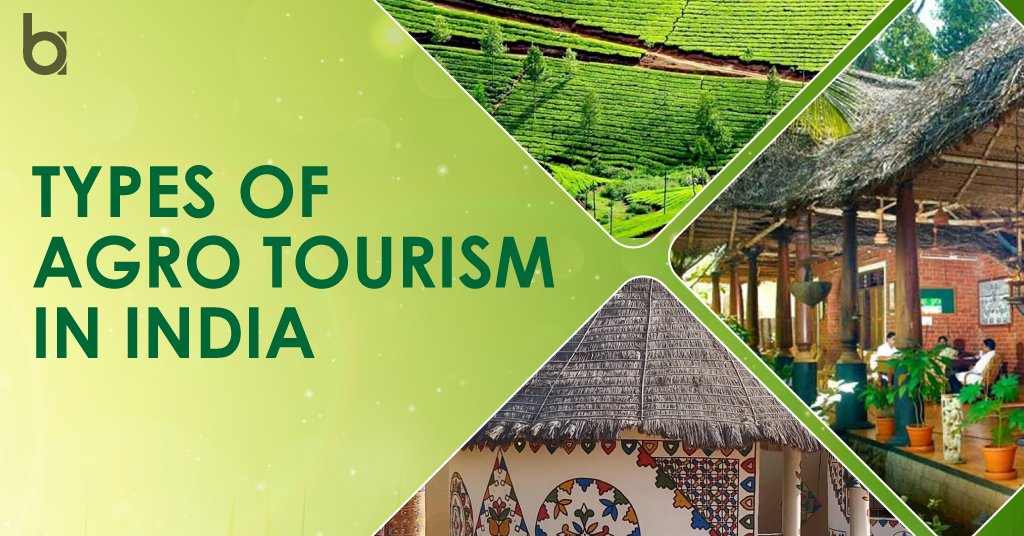
Each type of agro tourism in India offers a distinctive experience, allowing visitors to connect with nature, understand local culture, and gain insights into the country’s agricultural heritage. Moreover, these diverse options make India an attractive destination for tourists seeking authentic and enriching rural experiences.
- Culinary tourism: This type of tourism centers around food experiences and culinary traditions. Tourists can indulge in farm-fresh meals, cooking workshops, and local produce and regional dishes tastings.
- Wine and vineyard tourism: India has a growing wine industry, particularly in regions like Nashik in Maharashtra and Karnataka. Wine and vineyard tourism allows visitors to explore vineyards, learn about winemaking processes, and sample different wines.
- Tea estate tourism: India is renowned for its tea production, and tea estate tourism allows tourists to visit tea plantations in places like Darjeeling and Assam. They can witness tea plucking and processing and learn about the tea culture.
- Spice plantation tourism: In Kerala and other southern states, spice plantation tours offer visitors the chance to explore aromatic spice gardens, learn about various spices, and understand their culinary and medicinal uses.
- Fruit orchard tourism: Certain regions in India, like Himachal Pradesh and Uttarakhand, offer fruit orchard tours where tourists can pick fruits, enjoy scenic landscapes, and experience rural agricultural life.
- Ayurveda and wellness tourism: This form of agro tourism focuses on traditional Ayurvedic practices and wellness therapies. Moreover, tourists can engage in rejuvenating treatments and yoga retreats, as well as learn about Ayurvedic medicinal plants.
- Sustainable and eco-tourism: Some agro tourism initiatives focus on promoting sustainable and eco-friendly practices. Tourists can participate in eco-friendly farm activities, learn about conservation efforts, and support responsible tourism.
- Rural craft and art tourism: This type of agro tourism involves visiting rural artisans and craftsmen to learn about traditional crafts like pottery, weaving, and handloom work and purchase unique handmade products.
- Adventure tourism: Adventure tourism offers tourists the opportunity to engage in various outdoor activities amidst rural landscapes. These activities often involve exploring nature and agricultural areas in an adventurous and active manner.
Benefits of the Industry
Agro tourism in India promotes a symbiotic relationship between agriculture, tourism, and local communities. It fosters sustainable development, cultural understanding, and economic success while safeguarding the country’s natural and cultural heritage.
- Economic Boost: Agro tourism generates additional income for farmers and rural communities, helping to diversify their revenue sources. It also creates employment opportunities through various services like farm stays, guided tours, and local crafts, contributing to the growth of the local economy.
- Agricultural and Environmental Sustainability: Agro tourism encourages sustainable agricultural practices as farmers often showcase eco-friendly methods to tourists. This fosters awareness about responsible farming. Moreover, it emphasizes the conservation of natural resources and the importance of biodiversity preservation.
- Cultural Exchange and Social Integration: Agriculture tourism facilitates cultural exchange between tourists and local communities. Thus, visitors gain insights into rural traditions, festivals, and customs, promoting mutual understanding and appreciation of diverse cultures. This social interaction helps bridge the gap between urban and rural populations.
- Preservation of Rural Heritage: Agro-tourism plays a role in preserving traditional knowledge, crafts, and skills that might otherwise be at risk of fading away. By valuing and showcasing rural heritage, it helps maintain cultural identity and heritage for future generations.
- Health and Well-being: Agro tourism promotes physical and mental well-being through outdoor activities, such as hiking, biking, and farm-related tasks. It provides a refreshing escape from urban life, offering tourists a chance to connect with nature and experience a healthier lifestyle.
- Conservation of Agricultural Land: Farmers may be incentivized to maintain their agricultural lands instead of converting them into non-agricultural uses by promoting agro-tourism. This helps protect valuable agricultural resources and prevent further urban sprawl.
Top Agro Tourism States to Visit in India
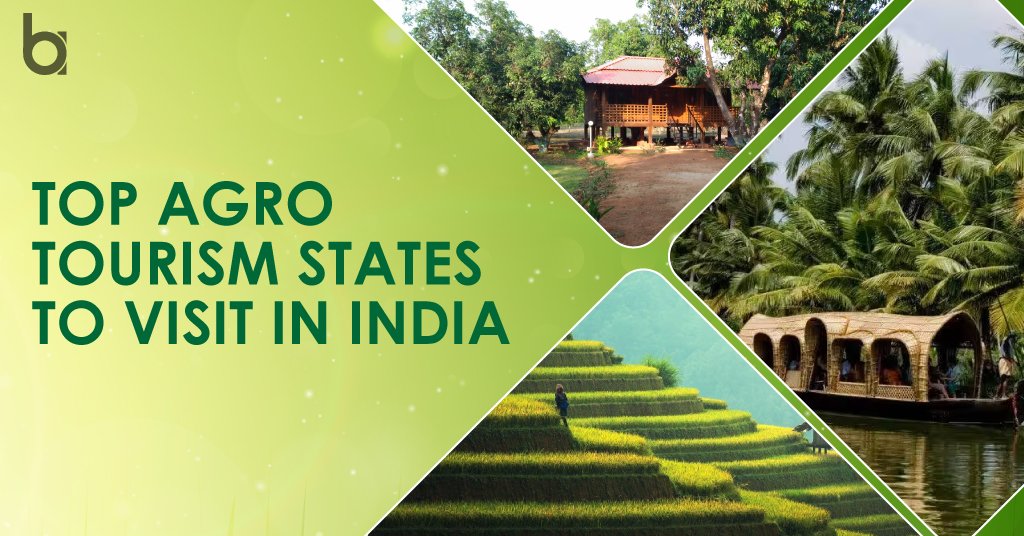
India offers many captivating agro tourism destinations, each boasting unique agricultural landscapes, cultural experiences, and adventure opportunities. Here are some of the most popular states to explore:
- Maharashtra: Maharashtra’s rich agricultural heritage makes it an ideal destination for agro tourism. Farm stays offer a glimpse into rural life, while heritage tours unveil the state’s cultural gems. Adventurous travelers can explore Maharashtra’s diverse Sahayadri mountain range and the scenic landscapes of Konkan.
- Kerala: Kerala always surprises every tourist on their trip in its verdant hills and tranquil backwaters. In addition, tourists can enjoy farm stays amidst lush plantations, participate in heritage tours to learn about the state’s rich cultural traditions, and engage in adventure activities like hiking and river rafting.
- Himachal Pradesh: Nestled in the northern region of India, Himachal Pradesh captivates with its majestic mountains, forests, and valleys. Moreover, agro tourism here includes farm stays that allow visitors to immerse themselves in rural life. Additionally, there are treks through scenic landscapes and camping in the lap of nature.
- Uttarakhand: With its holy mountains, sacred rivers, and dense forests, Uttarakhand has a magical experience for every tourist. Visitors can indulge in farm stays, hike through breathtaking trails, and enjoy thrilling rafting adventures.
- Tamil Nadu: Diverse agricultural practices and lush landscapes make Tamil Nadu an excellent destination for agro-tourism. Tourists can explore tea and coffee plantations in the Nilgiris. Moreover, visit spice gardens in Kerala and discover traditional agricultural practices in rural areas.
- Assam: The tea gardens of Assam allow visitors to learn about tea cultivation and processing. Additionally, tourists can explore the rural life of the state’s tribal communities and indulge in traditional Assamese cuisine.
- Karnataka: The state’s diverse landscapes contain every possible attraction, from beaches, and jungles to widely spread farm lands. Karnataka offers attractions such as visits to coffee and spice plantations in Coorg and exploring rural charm in the Malnad region.
Factors Driving India’s Agriculture Tourism

Key factors are propelling the agro tourism market’s growth in India:
- Increasing Demand for Sustainable Tourism: Tourists are showing interest in sustainable tourism, recognizing its significance in preserving the environment and supporting local communities. Thus, agro-tourism, focusing on sustainable farming practices and rural experiences, aligns well with this trend.
- Surging Popularity of Farm Stays: Farm stays have gained significant popularity among tourists, as they offer a unique opportunity to immerse themselves in rural life and engage in agricultural activities. These authentic experiences attract travelers seeking meaningful connections with nature and local culture.
- Government Initiatives Promoting Rural Tourism: The Indian government’s proactive efforts to promote rural tourism foster the agro-tourism market’s growth. By incentivizing and supporting rural initiatives, the government aims to uplift the rural economy and preserve traditional heritage.
Final Thoughts
Agro tourism in India offers a diverse and enriching rural experience to visitors. With its vast agricultural landscapes and rich cultural heritage, tourists can engage in farm stays, learn about sustainable practices, and bridge the gap between urban and rural communities. States like Kerala, Himachal Pradesh, and Rajasthan provide opportunities for adventure tourism, while Punjab showcases the impact of the Green Revolution. From tea gardens in Assam to spice plantations in Karnataka, each region offers unique experiences. This sustainable and educational form of tourism benefits local economies, promotes environmental conservation, and fosters cultural understanding in India’s countryside.
Keep Reading! Keep Growing!
- Who is the Founder of Agro Tourism?
Ans: The founder of agro-tourism is considered to be Klaus Obermeyer, an American who first coined the term “agro-tourism” in 1983. Additionally, he is known for his pioneering work in fruiting trees and the development of the “Tobacco Control Act” in the United States.
- Who is the Founder of Agri-tourism in India?
Ans: The founder of agri-tourism is Pandurang Taware, known as the “Father of Agri Tourism” in India. He has been a prominent figure in promoting agri-tourism and has received various awards and recognition for his work in this field. For instance, in 2010, he received the National Tourism Award from the Vice President of India.
Taware is the founder, managing director, and chief promoter of the Maharashtra State Agri & Rural Tourism Co-operative Federation Ltd. He is also working to create an international body to promote Agri-tourism.
- Which country is famous for agro tourism?
Ans: The concept of agro-tourism has gained considerable attention in recent years. The countries like India, Australia, Malaysia, the USA, etc. are popular destinations for agro-tourism. However, rising infrastructure and government policies are building the ladder for India to develop agro tourism at its best.
- What is the full form of Agro?
Ans: Agro is a shortened form of agronomy or agriculture. In English, “agro-” is a combining form that refers to fields, soil, or agriculture.
Parag Ahire
ALSO READ: Top 10 Indian Healthcare Companies that Furnish the Best Medicaments

BusinessApac
BusinessApac shares the latest news and events in the business world and produces well-researched articles to help the readers stay informed of the latest trends. The magazine also promotes enterprises that serve their clients with futuristic offerings and acute integrity.
Subscribe To Our Newsletter
Get updates and learn from the best, more to explore.

Tech Revolution in Online Casinos: Essential Insights for Business Leaders

The Rise of Online Casinos in APAC: Key Business Trends and Opportunities Unveiled
Your business stories meet the right audience, start typing and press enter to search, quick links.
- Subscription
Company Info
- Privacy Policy
- Terms & Conditions
Our Services
- Advertise With Us
- Press Release

West has been driving the business world owing to its developed economies. The leading part of the world is straining to sustain its dominance. However, the other parts of the world, especially Asia Pacific region have been displaying escalating growth in terms of business and technological advancements.
- +91-7666256451
Copyright © 2022 - Business APAC. All Right Reserved.
Hire us to spread your content.
- Agriculture Farming
- Livestock Farming
Project Reports
- Hydroponics
- Best Fertilizers
- Vertical Farming
- Sheep Farming
- Goat Farming
- Poultry Farming
- Fish Farming
- Pig Farming
- Dairy Farming
- Rabbit Farming
- Success Stories of Farmers
- Boost Fruit Yield
- District Wise Crop Production
- Schemes & Subsidies
- Agriculture Colleges
- Farm Insurance
- Disease Control And Management
Agriculture
Aquaculture
Horticulture
Agri Business
Agriculture Tourism In India, Benefits of Agri Tourism
Table of contents.
- Agriculture Tourism
The Need for Agriculture Tourism
Importance of agriculture tourism, benefits of agriculture tourism for the farmers:.
- Benefits of Agriculture Tourism for the communities:
- Benefits of Agriculture Tourism for Tourism Operators:
Benefits of Agri-tourism for the people living away from farms:
- The scope of Agriculture Tourism
- Services/Activities of Agriculture Tourism
- Principles of Agriculture Tourism
- Main factors of Agriculture Tourism
Agro Tourism Resorts in India:
agriculture tourism.
Today, let us discuss Agriculture Tourism In India and the need for agritourism.
Agricultural tourism is the one that is trending worldwide currently. This makes the urban people get out of their daily routine and go back to their rural roots. It would be a very good market for tourists. There is an aspect of education as it involves interaction with individuals. Individuals will start enjoying the processes and also learning about the various items. Agricultural tourism is becoming an important part of the development of tourism and brings back the people who have completely moved to urban areas and lost contact with agriculture. Tourism in Agriculture is the one that has a set of social and economic activities which occur. Their products, experiences, and services will get linked to travel.
Agricultural tourism is the one which makes people stay close to the functions of the farm so that they can monitor the works and all the activities that take place in the daily business of agriculture.
Agriculture tourism will be the best opportunity to get experience and also get to know about the lifestyle of the farmers and how it is different from the ones who stay away from rural areas. This brings a lot of education to the people as they get to view all these farming functions in beautiful and peaceful locations.
Recreation in farms will include the activities which occur on lands of agriculture, which may also insist the individuals stay awake overnight, and also few activities of education. This particular category of tourism is one of the sections of a large industry called Agri-Tourism.
Agriculture tourism is an enterprise that is set up for a commercial purpose on a functioning farm for the entertainment of the tourists or visitors which would generate an additional income to the owner.
Agriculture tourism is one of the sections of a bigger industry called rural tourism, which will again include resorts, markets of the off-site farmers, agricultural tours which are conducted expecting no profit, business which are made for the leisure and hospitality of the visitors which come from the countryside.
There are two differences between rural tourism and agricultural tourism.
- The enterprises of rural tourism will not place on the farm or agricultural plant necessarily.
- Rural tourism will not provide any sort of additional income to the owners.
In case if you want this: Soil Erosion Causes, Soil Conservation Methods .
Nature is an open opportunity for learning without any closed doors or walls. If nature is observed carefully, you can explore the treasures which are hidden in it and get to know more things about it. As India is a country that has a majority of the population depending on agriculture, people would get to learn more information from it. The population belonging to urban areas is increasing on a daily basis and the children belonging to the urban families are able to view nature on television. This is because they are very much restricted to closed buildings, video games, junk foods, the internet, and all the activities which would spoil them physically and mentally. People living in urban areas also stopped visiting their relatives in rural areas as they got habituated to a comfortable life in the cities. These days, Agriculture is becoming a business and most of the poor people are not in a position to afford it. There is also a slow decrease in the fertility of the soil and land which is decreasing the yields. There is a major need for the farmers to start a business that would support the farm by generating income and also make the people know about the importance of agriculture and the life of farmers.
As agriculture these days is being commercialized by completely concentrating on large productions, agri-tourism will give an opportunity for the farmers to share the works done on a farm with the individuals. Agricultural tourism will allow the farmers to sell the vegetables or any other products grown on the farm to the tourists or visitors. This would again be a source of income for the farmers. The education has completely included the technology courses to a more extent and as a result of this, children will grow without any sort of knowledge regarding the farm animals or farm life. Hence, tourism in Agriculture will give an opportunity to the children to learn about the farm culture to some extent at least.
- There would be a chance for the farmers to expand the operations of farming.
- There would be an increase in the revenues of the farm.
- There would be development in the consumer markets and as a result, employment increases.
- The awareness about the agricultural goods which are produced locally will increase.
- People living in urban areas will get to know about the importance of agricultural land.
- The living conditions of the farm will increase, which would, in turn, lead to an increase in the opportunities for farm recreation.
- The skills of management and the spirit of entrepreneurship will be improved.
- The businesses of the farm will have an opportunity to sustain themselves for a long time.
Benefits of Agriculture Tourism f or the communities:
- It generates supplementary income for the local businesses as they need to provide services for visitors or tourists.
- There would be an upgrade in the facilities of the communities for the sake of tourists.
- There would be an improvement in the protection of the landscapes in the rural areas as it needs to serve the tourists.
- The traditions which are followed locally in terms of art and craft will be preserved as they will have an opportunity to create markets if tourism is developed.
- This promotes inter-regional and intercultural communication.
- There would be an increase in awareness about the issues related to agriculture and also the values followed.
- The local products and services which are part of agriculture can be promoted.
- The rural economy can be strengthened which would create income through jobs.
Benefits of Agriculture Tourism for Tourism Operators:
- There would be a chance to mix the services and products of tourism to visitors.
- Tourism will be improved even in rural areas.
- Tourism markets will have a unique place in rural areas
- The length of the season will increase mainly in the off-peak business times which are traditionally followed.
- The currency, which is non-local will be flowing into the businesses which are set up in the rural regions.
- The farm which is a part of agri-tourism will provide urban people to interact with nature. Though they directly will not participate in the farming activities, they would watch closely the operations of farming and get to know about the importance of it. Visitors can also enjoy the scenic beauty of nature and farming.
- Farming will create an opportunity for tourists or visitors to learn about how farming operations are carried. It also helps to educate visitors about how to combine tourism and the preservation of the environment.
In case if you miss this: Sprinkler Irrigation Design, Layout, Components, Cost .
The scope of Agriculture Tourism
- In agri-tourism, the costs of accommodation, food, and travel will be very low. This is to enhance the tourist population. The current concept of travel and tourism is just to urban areas which are just a section of the population. Hence, the Agri-tourism will take travel and tourism to a huge population which will enhance the scope of tourism.
- The urban population, which have their roots in the rural areas will always show interest in learning about the sources of food, wood, languages, arts, crafts, dresses, etc. Agri-tourism will satisfy the urban population who are curious to learn about farming.
- Rural areas will give an opportunity for recreation at a low cost to the children, middle and low-class families. The festivals, dresses, games which are conducted as a part of agri-tourism will entertain the whole family.
- The people living in urban areas have a lifestyle that includes stress due to which the average life span has decreased. The individuals trying to earn more to live a comfortable life, due to which they work for more hours and miss peace in their lives. Agri-tourism will help these people to achieve peace as it would be away from all these polluted areas.
- The urban population is searching for the means of healthy living and interaction will villagers would help them to know about their medical knowledge which is indigenous. The foods which are cultivated organically have much demand among the urban populations due to which they are approaching the villages for the solutions.
- The urban population who have a busy lifestyle are always trying to be close to nature in their free time. Mountains, crops, rivers, lakes, birds will make the urban population forget about their busy life and be close to nature.
- The urban population is overcrowded and hence as they do not want to disturb each other’s peace, they are going beyond the cities for the sake of resorts. Good efforts are made to create the village atmosphere in the name of resorts in which farmhouses are built which would be the same as the farms.
- Agri-Tourism in the future would bring a much urban population to farming which will technically improve the farming operations. As agri-tourism makes the people believe in the magic of nature, this would not only help the people commercially but also the agriculture operations increase.
Services/Activities of Agriculture Tourism
- Rides on Bullock cart.
- Bullock ploughing.
- Riding on Horseback.
- Buffalo riding
- Watching the animals which are grown on the farm for domestic use.
- Fishing in rivers or lakes or ponds.
- Camping/picnicking (combined)
- Rides in Jeep
- Games in the rural areas
- Riding Motorcycles on the off-road
- Tours with schools
- Tours to gardens or nurseries.
- Tours to wineries.
- Agro-technical tours
- Exhibitions of agriculture in history.
- Tours to Micro-breweries
- Visits to Poultry Farm.
- Visits to Sugar Factory.
- Visits to Wine or Liquor Factory
- Silk formation can be viewed.
- Entertainment in the form of festivals of harvest etc.
- Services of hospitality include stay on the farm, guides for the tourists etc.
- Sales of the farm products directly.
Principles of Agriculture Tourism
Agri Tourism should make sure that the below principles are followed:
The appeal is in the form of both visual and physical:
Agricultural tourism should make sure that the visitors or the tourists are provided with something which is unique to the sight and also the feeling which comes physically. For example, good grains or oilseeds are grown in various stages, medicinal plants, various vegetables, fruits, flowers, animals, lakes will attract the youngsters and the kids. Crafts, games, art, apparel will create sufficient interest and excite many tourists.
Participation and Involvement of the tourists: Agri-Tourism should be in such a way that it gives an opportunity for the visitors or tourists to participate in the activities of the farm. The farm activities would be like ploughing, harrowing the fields, buffalo riding, cooking, making crafts so that they would enjoy.
Provision of Sales Counter: There should be an option to pick and choose the cultivation which is done by the farmers of their own choice. Here, the tourists will harvest the produce of their own choice on the basis of payment. Hence the farmers can sell the foodgrains, seeds, vegetables, fruits, etc.
Main factors of Agriculture Tourism
There are a few main factors that contribute to the success of Agri Tourism.
- The farmer is the first one in the important factors of Agri-tourism. He is the one who is not educated well and is also innocent. He treats the guests with the utmost respect and with a complete heart. He not only entertains the guests but also entertains himself while explaining to the tourists or visitors about the farming process. The farmer is not a businessman which itself makes the touristy atmosphere clean and pure.
- The village is the one which is very far from the cities and has very few facilities which are provided in the urban areas. The investment for Agri-tourism is made by nature itself in the form of water-bodies, mountains, crops, etc. The villagers, when given a responsibility to host people, will treat the guests with due respect as they consider it as a part of their culture.
- The resources of agriculture which are in the form of land, plants, and water will be unique and will be changing from place to place. Each agricultural field is different which attracts tourists in a different way.
- Malshej Agro Tourism (Pune).
- Deorai Farms & Agro Tourism-Agro Resort (Pune).
In case if you are interested in this: How To Grow Strawberries in Greenhouse .
Common Challenges in Strawberry Farming: A Beginners Guide
Maximizing yield in ridge gourd farming: best practices and tips .
- Sustainable Agriculture with CRFs (Controlled Release Fertilizers): A Game-changer for Crop Productivity
Organic Farming vs. Natural Farming (ZBNF): Key Principles and Differences
Strawberry nursery establishment and management, modi vision for indian agriculture, government support and policies for zbnf in india, deworming schedule for sheep: a beginners guide.
- Ultimate Guide to Beans Farming in Kenya: From Planting to Profits
Ultimate Guide to Natural Vegetable Farming
Natural farming for sustainable livestock management, dairy farm technology in india: the future of dairy husbandry, comprehensive guide to organic farming in villages, modern sheep farming technology: the future of sheep husbandry, goat farming technology: the future of goat husbandry.
- How to Build a Low-budget Goat Shed: Cheap Ideas and Tips
Goat Farming Training Programs in India: A Beginner’s Guide
Types of pesticides used in agriculture: a beginner’s guide, economical aquaculture: a guide to low-budget fish farming, 15 common planting errors that can doom your fruit trees.
- How to Make Houseplants Bushy: Effective Tips and Ideas
- Innovative Strategies for Boosting Coconut Pollination and Yield
- Pollination Strategies for Maximum Pumpkin Yield
- The Complete Guide to Chicken Fattening: Strategies for Maximum Growth
- Natural Solutions for Tulip Problems: 100% Effective Remedies for Leaf and Bulb-Related Issues
- Revolutionizing Citrus Preservation: Towards a Healthier, Greener Future
- Natural Solutions for Peony Leaf and Flower Problems: 100% Effective Remedies
Great article, it contains all the information which one can know about organic tourism. Agro Tourism is a section in tourism industry which have a potential to grow a lot in near future as in this fast moving world where people spread themselves too thin and don’t have time to spend time with themselves and there family members and living a stressful life it will be a amazing experience for them to spend some time with nature and clear their mind of any distraction and revitalizing and energizing their mind and body. it is rightly said above that farmers are an important factor of agro tourism but in my opinion it is a duty of others as well to come forward and support farmers in spreading awareness and their are some amazing people who are supporting this as i was going through an article of an interview of Mr. Kan Singh Nirwan who is known for his new and revolutionary ideas in agriculture on Organicindiastory.com where he has shared his views on agro tourism and the potential this sector have and we need more people like Mr. Kan Singh to step forward and give their support towards Agricultural Tourism.
Please provide the details of Agro Tourism of DPR model.
LEAVE A REPLY Cancel reply
Save my name and email in this browser for the next time I comment.
Sustainable Agriculture with CRFs (Controlled Release Fertilizers): A Game-changer for...
Ultimate guide to beans farming in kenya: from planting to..., how to build a low-budget goat shed: cheap ideas and..., borewell drilling cost, pump price, and pipe cost, polyhouse subsidy, cost, profit, project report, tractor subsidy, bank loan, eligibility, schemes, process, malabar neem project report details guide, cold storage project report, cost and subsidy, mushroom farming project report, cost and profit analysis.
- Volume 10, Number 3
Innovative Agrotourism Trends- Maharashtra State as a Model for Cross-Cultural Tourism in India
1 Dr. D. Y. Patil Vidyapeeth, Global Business School and Research Centre Pune, Maharashtra, India
2 MBA Department, Dr. D. Y. Patil Institute of Technology, Pune, Maharashtra, India.
Corresponding Author E-mail: [email protected]
DOI : http://dx.doi.org/10.12944/CARJ.10.3.15
Article Publishing History
Review Details
Article Metrics
Both urban residents and farmers benefit from agro tourism. Farmers now have a second source of income, and family members now have a job opportunity. However, there are some issues with how such centers are being developed. Therefore, in order to advance and raise the income level of the farmers in Maharashtra, the government and other relevant authorities should try to support these activities. The study's goal was to investigate the difficulties that Konkan region agro-tourism centers faced 5 . It was noted that the Konkan division, the second-largest division in Maharashtra, has 33 agro tourism centers that have been successfully established (58.6 percent) Agro tourism businesses were established between 2008 and 2010, 22.2% of respondents were registered with the Maharashtra State Agro Tourism Co-operative Federation LTD (MART), but there was a lack of training for the industry (62.2%), poor communication skills (80%), a lack of coordination between the departments of agriculture and tourism (100.00%), and low levels of entrepreneurship (90.00%). (78 percent) 4 , utilizing a descriptive research methodology, primary and secondary data were collected using the questionnaire and observation as the main data collection tools. Journal articles, articles, websites, and other secondary data collection tools were used. 45 active agro tourism facilities in Maharashtra's Konkan region participated in the survey.
Agro tourism; Agribusiness enterprises; Cross-culture; Farmers; Maharashtra state
Current Development of Indian Agro –tourism industry
From a local to a worldwide level, the tourism sector is significant both economically and non-economically ways. The potential for agrotourism is limitless. India has a lot of possibility to explore its tourist potential and generate profitable returns from it. According to a private survey, Indian tourism is expanding at a rate of 10.1%, at the same time as global tourism is only expanding at a rate of 4% 2 . This indicates that Indian tourism is expanding at a rate that is 2.5 times faster than the global average.By adopting the concept of agrotourism, not only is the current growth rate sustained, but also this value-added contribution to future growth, particularly focusing on domestic tourism in addition to the package tourism, is made. Additionally, this would increase India’s tourism industry’s competitiveness on the world market.
Agro-Tourism: A New Tool for Socio-Economic Activities
Any rural individual farmer can launch an agrotourism business using his current resources as part of an innovative idea. Agrotourism facilities may be established by agricultural co-operative societies, non-governmental organizations, agricultural universities, and agricultural colleges in addition to individual farmers. Even community involvement is necessary for the success of agrotourism. Even Grampanchayats (Local Bodies), with the assistance of villagers and farmers, can launch such centres in their operational regions 1 . Agrotourism has a lot of potential in the current context because:
Agrotourism is a low-cost entryway.
An additional source of work and money for farmers who protest unpredictable revenue.
Urban residents who are concerned about their health and seek refuge in environmentally beneficial activities.
It satisfies interest in the farming sector and way of life.
There is a large need for healthy, family-friendly recreational activities.
Fosters an appreciation for and interest in nature.
It is a useful resource for fostering cultural change among urban and rural populations.
A novel approach to lessen disappointment with overcrowded cities and resorts.
Reminiscence of their farm-based origins.
The educational benefits of agrotourism.
Assists in lightening the load on other established tourist destinations.
The best resource for cross-cultural transmission, last but not least.
Objectives of the study
To analyze the trends in agro-tourism industry in the state of Maharashtra as a model for cross-cultural tourism in India
To recognize agro tourism as a cross-cultural trending instrument and to offer recommendations for presenting Maharashtra State as a “Model of Indian Agro-tourism.”
Hypothesis of the study
The level of awareness and both tourists and farmers have a positive relationship.
The level of entrepreneurial culture and both tourists and farmers have a positive relationship.
There is a positive relationship between bank loan interest and both tourists and farmers.
Research Methodology
Sources of data
The Maharashtra State Agro Tourism Co-operative Federation Limited (MART), Maharashtra Tourism Development Corporation Ltd. (MTDC), and Agro-Tourism Development Corporation’s records provided the study’s primary data and basic information (ATDC). The investigator then conducted one-on-one interviews with the owners of agro tourism centers after creating an interview schedule with goals in mind.
The following sources provided the secondary data and other pertinent information for the study:
Published studies, papers, and other data from various agriculture organizations.
Reference materials related to the topic published by various authors and organizations, including reports, bulletins, journals, and periodicals.
Taking part in training sessions, seminars, and workshops on the subject.
Locale of the study
The Konkan region of Maharashtra state served as the site of the current study.
Research design
The study’s research design was exploratory.
Selection of the respondents
Thane, Palghar, Raigad, Ratnagiri, and Sindhudurg districts are located in the Konkan region. The study covered each of Konkan’s five districts. Agro tourism facilities are located in the area and are registered with the Maharashtra State Agro Tourism Co-operative Federation Limited (MART), the Maharashtra Tourism Development Corporation Ltd. (MTDC), and the Agro-Tourism Development Corporation (ATDC). Agro tourism facilities are also operating in the area without being registered with any organization.
In order to identify the actual operational agro tourism centers, a pilot survey was conducted in five districts of the Konkan region: Palghar, Ratnagiri, Raigad, Sindhudurg, and Thane.
50 operational agro-tourism centers were chosen for the study from a list of well-functioning working agro-tourism centers that was created with the aid of the pilot survey. 45 respondents from five different districts were chosen at random to make up the sample.
Construction of Schedule
The scheduled structured interviews are used as a tool for data collection. An interview schedule was created with the study’s goals in mind.
Data collection was done using the personal interview technique.
Statistical analysis
Using parameters like frequency, percentages, mean, and standard deviation, the data were processed and tabulated.
Result and Analysis
Current agro tourism conditions in Maharashtra’s Konkan region
Maharashtra’s division-specific agro tourism destinations
Maharashtra’s division-specific agro tourism destinations (November, 2020) under the auspices of Maharashtra State Agricultural Tourism Cooperative Federation Limited (MART) 3
Table 1 and Fig. 1 were reviewed to determine the distribution of agro-tourism centers by division in the state of Maharashtra. Of the centers registered with MART, slightly more than two-thirds (58.6%) were located in the Pune division, and 21.1% were located in the Konkan division. Nasik came in second with 3.8 percent of the agro-tourism centers, followed by Nagpur with 11.5 percent, Amravati with 2.4 percent, and Aurangabad division with 2.21 percent. The highest number of active agro tourism facilities is 124, located in Pune division. With 33 successfully established agro tourism centers, the Konkan division of Maharashtra is the second-largest division.
Year of establishment
The data pertaining to the year of establishment of agro-tourism enterprises are given in Table 2.
As seen in Table 2 and Fig. 2, the majority of agro tourism businesses (44.4%) were founded between 2006 and 2007, 22% between 2008 and 2010, 13.3% between 2005 and 2006, and 8.8% between 2001 and 2005 and 1970 to 1990, respectively.
This business gained traction after the Agro-Tourism Development Corporation (ATDC) was founded in 2005 and the Maharashtra State Agro Tourism Co-operative Federation Limited (MART) in 2008. The agro-tourism concept began to gain popularity as a result of the federation’s efforts in both areas, particularly in promoting the concept in urban areas and providing training to farmers regarding agro-tourism.
Agro-tourism center registered under organization
The first state in India to introduce agro tourism was Maharashtra. Numerous societies, organizations, and NGOs working on agriculture tourism in the Maharashtra state have received official recognition from the Maharashtra government. Table 3 displays the distribution of respondents by the organization that their agro-tourism centre is registered with.
The Agro Tourism Development Corporation (ATDC) and the Maharashtra State Agro Tourism Co-operative Federation LTD respectively registered 38.0% and 33.3% of the respondents, respectively, according to Table 3 and Fig. 3, respectively (MART). Only 40% of respondents were registered with the Maharashtra Tourism Development Corporation, however (MTDC)
Agro tourism centers have been established by farmers in the Konkan region and throughout the state as a result of the MTDC and ATDC initiatives to launch the Mahahraman scheme and Agro Tourism Vistar Yojana, respectively. With the primary goal of coordinating the activity of planning, financing, marketing, and liaison with various state and central governmental agencies, MART is similarly working on the agricultural tourism line.
Challenges faced by the agro-tourism center owner for running agro-tourism center
The following are some of the main obstacles or roadblocks to the proper development of agro tourism enterprises:
According to Table 4, the owner of an agro-tourism centre faced challenges such as a lack of training in agro-tourism (62.2%), poor communication skills (80%), a lack of coordination between the agriculture and tourism departments (100.00%), low awareness of agro-tourism among farmers and tourists (48.8%), a low level of entrepreneurial culture (78%).
Maharashtra’s Konkan region is experiencing rapid growth in agro tourism 6 . Despite this, there are obstacles preventing Maharashtra’s agro-tourism industry from developing further. Here are a few of them
Weather conditions
Orientation issues in customer communications and marketing fragmented and less productive land
Lack of understanding of government agricultural policies and programmes
Fewer visitors are drawn to the agro tourism centre.
Table 1: Maharashtra’s division-by-division distribution of agro tourism destinations (December, 2019) Licensed by the Maharashtra State Agricultural Tourism Cooperative Federation Limited (MART)
Table 2: Distribution of the agro tourism destinations based on the founding year.
Table 3: Distribution of the agro tourism centers according to the organization that each one is registered with
Table 4: Distribution of the respondents in accordance with the difficulties the owner of the agro tourism centre has in operating the centre
The findings regarding the difficulties faced by the proprietor of an agro tourism facility are shown in Table 4.
Table 5: Hypothesis Testing
The significant values 0.03, 0.02 and 0.01 respectively which is less than standard significant value of 0.05. Hence, it is proved that there were positive and significant relationships founds. According to table 5, the current study’s hypotheses are accepted and the null hypothesis is rejected.
In summary, agro tourism is beneficial to both traditional and contemporary agricultural activities. Farmers now have the chance to use the available resources in a diversified and creative manner. Both farmers and tourists benefit from it, which is a win-win situation. By creatively utilizing the resources at their disposal, farmers can increase their income, and tourists can affordably enjoy rural life and nature. Additionally, the growth of agro-tourism is advantageous for the villages. A few instances of agro tourism in the Maharashtra district’s Konkan region. Agro tourism has been demonstrated in Raigad, Ratnagiri, and Sindhudurg to benefit a village’s overall social and economic development in addition to the development of its farmers. Despite the fact that agro tourism is expanding, government support through appropriate and favorable policies for its development is still lacking. As a result, the government should give Maharashtra’s agro tourism industry priority through appropriate policy measures.
To promote and spread the idea of agro-tourism as an easily adaptable and implementable business for farmers in India, a proper business model is required. All of the aforementioned issues can be resolved, and agro tourism can be introduced gradually and piecemeal. It all depends on the farmers’ determination and the effective marketing techniques used to sell the idea to weekend visitors.
Acknowledgement
There is no any the funding sources to conduct this research
Conflict of Interest
There is no any conflict of interest including any financial, personal or other relationships with other people or organizations that can influence their work.
Funding Sources
There is no funding sources
- Deepika Chadda (2012). Socio-economic implications of agri tourism in India. International Conference on Innovation, Trade and Economics– ICITE. Hong Kong: International Economics Development and Research Center, 151-155.
- Hamilpurkar, S. (2012). Agritourism in Karnataka: Issues, constraints and possibilities. International Journal for Research in Commerce, Economics and Management, 2(7): 106-112.
- Haque, Md. A. and Islam, F. (2015). Problems and prospects of tourism industry at Sylhet region in Bangladesh. IOSR Journal of Research and Method in Education, 5(5): 23-32.
- Jagtap, M. D., Nichit, M. B. and Benke, S. R. (2010). Agro-tourism: the performance, problems and prospects for the farmers in Maharashtra. International Journal of Commerce and Business Management, 3(1):153- 156
- Sengar Priya (2017). Prospects of women entrepreneur’s challenges and their problems in Rajasthan (India). International Journal of Multidisciplinary Research and Development, 4(11):168-172.
- Shinde, H. R. (2019). Performance of agro tourism centers in Ratnagiri district (M.S.): an economic analysis. M.Sc., (Agri.) Thesis Dr. Balasaheb Sawant Konkan Krishi Vidyapeeth, Dapoli, Maharashtra
You may also like...
Modelling and analysis of areca nut collecting machine, bioconversion of floral waste into biocompost by using microbial consortium from cow dung, a correlational analysis of the phosphate solubilising bacteria the growth rate of lady rosetta potato.
- Submit Article
- BLOGS-English
- BLOGS-Hindi-ब्लॉग हिन्दी मे
- AGRI-TOURISM
- Amazing Fun and Interesting Facts
- Animal husbandry practices
- Animal Husbandry Startup India
- Animal Nutrition-पशुपोषण
- Animal Reproduction-पशु प्रजनन
- Appointment/Posting/Transfer
- Back2Basics-शहर से गाव की ओर
- होम्योपैथी चिकित्सा पद्धति
- CAREER-करियर
- Backyard Poultry
- BACKYARD POULTRY (LITB)-देशी मुर्गी पालन
- BANKING & INSURANCE
- BEE KEEPING
- BEST ARTICLE WRITTING AWARD
- BIO-MEDICAL WASTE
- Biochemistry
- BIOFLOC AQUACULTURE
- BIOGASS PLANT
- Bioinformatics
- Biosecurity
- Biotechnology
- Bioterrorism
- Birdwatching
- Eggs Production
- Emergency Cases
- EXOTIC BIRDS
- EXOTIC PETS
- FARM TO FORK
- FARMER’S ISSUE
- Farmers Corner
- Feed additives
- Feed and Grain
- Feed Ingredients
- Fodder Production
- Govt.Schemes
- Hall of fame
- HERBAL & MEDICINAL PLANTS
- INDIAN VETERINARY DAY
- INDUSTRY FACTS & FIGURES
- INNOVATIVE FARMERS
- Innovative Technology
- Inspiring Lady Veterinarian Awards 2021
- Integrated Livestock Farming System
- International Trade
- IT & ICT in livestock
- Lab technique
- LAB TO FARM
- Laboratory Animal
- LEAD ARTICLE
- LIVESTOCK MARKET
- livestock nutrition-पशु पोषण
- Livestock Pharma
- LIVESTOCK PRODUCTS
- MEDICINAL PLANTS – औषधीय पौधे
- MILK & MILK PRODUCTS
- Miscellanious
- Online training
- Organic Livestock Farming
- PANCHAGAVYA
- PASHU-SAKHI पशु सखी
- PashudhanPraharee News
- PET INSURANCE
- poultry Biosecurity
- Poultry Diseases
- Poultry Logistics
- Poultry Nutrition
- PRESS RELEASE
- Primary animal health care worker
- Processing & Slaughter
- Reliance Foundation
- Research Articles/Papers-PG/PhD Abstracts
- RESEARCH-ANIMAL HUSBANDRY & VETERINARY SCIENCE
- Review Articles
- REVIEW NOTES
- skill development & capacity building
- SOCIAL SERVICES
- Technologies Developed-Poultry
- TECHNOLOGY-INNOVATION
- Telemedicine
- Traditional herbal formulation for cattle & Buffaloes
- TURKEY FARMING
- TYPICAL CASE HISTORY & SUCCESSFUL VET’S INTERVENTION
- VACCINATION
- VETERINARY ASSOCIATION
- World Rabies Day Award
- YELLOW PAGES OF VETERINARY & A.H
- अपनी दुधारू गाय खुद तैयार कीजिए
- खारे पानी की मछलियां
- UPSC ANIMAL HUSBANDRY
- घरेलू नुस्खा -परंपरागत पद्धति द्वारा पशुधन का ईलाज
- जलवायु परिवर्तन
- जीवामृत /नीमामृत
- जेरो बजट -उन्नत खेती
- जैविक पशुपालन
- डेयरी के सुल्तान
- डॉ वर्गीज कुरियन इनोवेटिव डेयरी फार्मर्स अवार्ड
- डॉ संजय कुमार मिश्र की कलम से
- ताजे पानी की मछलियां
- दुग्ध उत्पाद .मूल्य संवर्धन (value addition) एवं दुग्ध प्रसंस्करण
- देसी मुर्गी पालन
- पशु रोग -निदान एवं उपचार
- पशुधन -नस्ल
- पशुधन उत्पाद
- पशुधन प्रबंधन
- पशुपालक पाठशाला
- पशुपालको की समस्या एवं समाधान
- पालतू जानवर
- पेट्स प्रबंधन
- प्रकाशन शुल्क (Publication Fee)
- बायोफ़्लोक पद्धति
- भारतीय पशु चिकित्सा दिवस
- मधुमक्खी पालन
- मशरूम की खेती
- महिला स्वावलंबन
- मोती उत्पादन
- सफलता की कहानी
- सब्जियों की खेती
- समेकित खेती
- साक्षात्कार
- सावीन भोगरा की डायरी से
- हाइड्रोपोनिक्स
- हारा चारा उत्पादन
- ADVERTISEMENT TARIFF
- NEWS & VIEWS
- Savitribai Phule Excellence Award for Lady Veterinarian
- SRI AWADHESH KR. SINGH MEMORIAL AWARD
- Sri Ram Singh Memorial Animal welfare Award
- Pashudhan Samriddhi India Awards 2020
- PASHUDHAN SAMRIDHI INDIA AWARDS 2021
- ONE HEALTH AND WORLD RABIES DAY LOUIS PASTEUR AWARD OF EXCELLENCE
- LOUIS PASTEUR ANIMAL CARE & VETERINARY SERVICES AWARD
- NAKUL-SAHDEO PASHU SEVA AWARDS
- Dr C. M. Singh Birth Centenary Year Celebrations
- DR G.L JAIN AWARD
- Dr V.Kurien. Excellence Award
- Dr. Bhagabat Panda National Award of Excellence in Poultry Science
- Dr.Arun Krishnan Aquaculture entrepreneurship Award
- Dr.B.V.RAO GLOBAL POULTRY ENTREPRENEURS ICON AWARD
- DR.CM SINGH –“SHALIHOTRA” GAURAV RATNA AWARD
- DR.CM SINGH –“SUSHRUTA” GAURAV RATNA AWARD
- Dr.CM Singh Award
- Dr.R.K GOEL MEMORIAL AWARD OF EXCELLENCE IN VETERINARY HOMEOPATHY
- Dr.Sohan Singh Rathore ,Best Equine Veterinarian Award
- Dr.V.Kurien Innovative Dairy Farmers Award
- Editorial Board
- APPS RELATED TO ORGANIC LIVESTOCK FARMING
- Broiler Farming
- Dairy Farming
- DUCK FARMING
- EMU FARMING
- Goat Farming
- layer farming
- Dairy Farming-डेयरी फ़ार्मिंग
- Pig Farming
- Rabbit farming
- PIGEON (SQUAB) FARMING

- Animal Welfare-पशु कल्याण
AGRI TOURISM – FUTURE OF INDIAN TOURISM : SUSTAINABLE AGRI STARTUP OPPORTUNITY TO THE INDIAN FARMERS
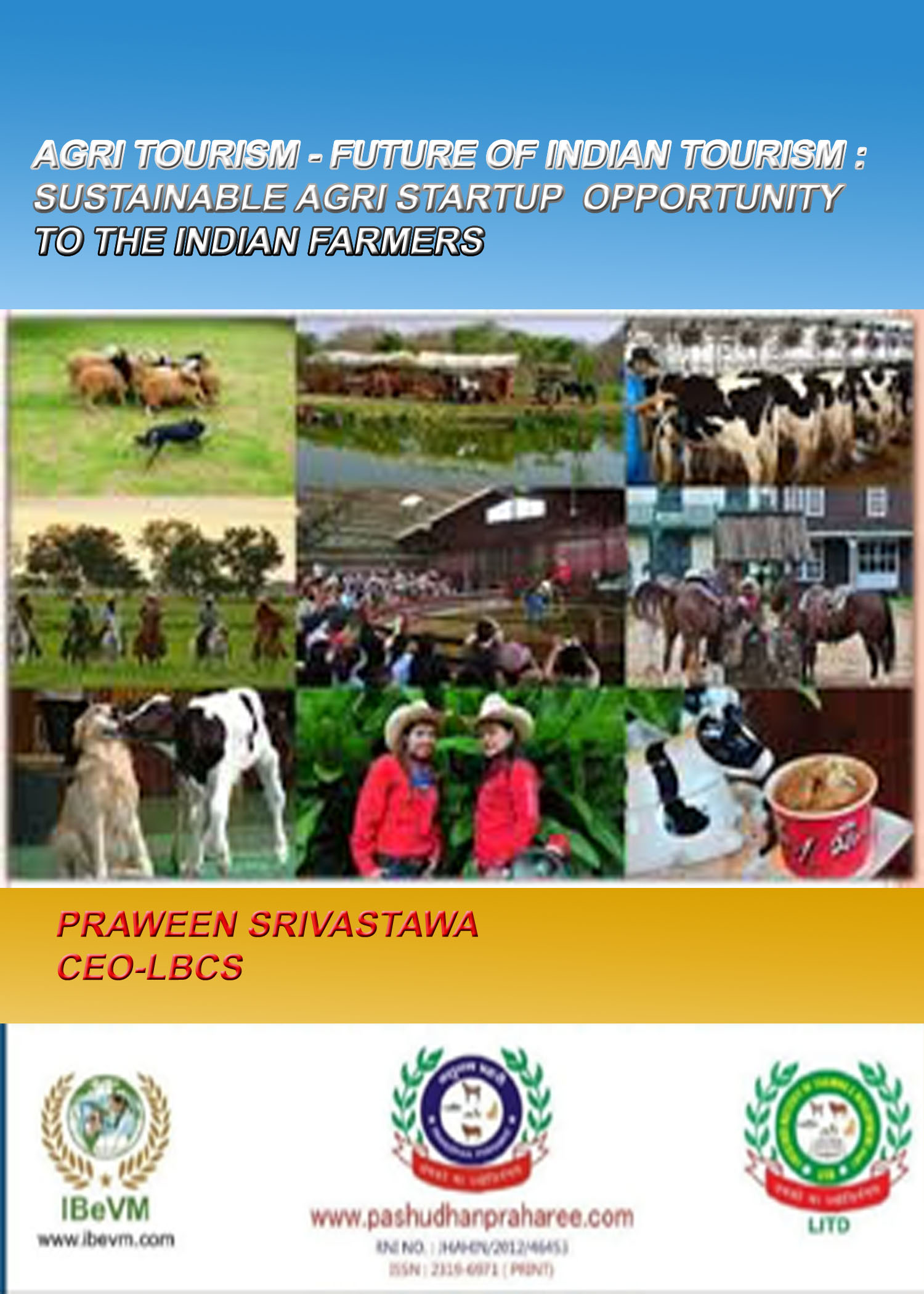
Compiled & shared by-
PRAWEEN SRIVASTAVA,CEO-LBCS
A growing number of farmers are turning entrepreneurs and earning big bucks from something they offered free to friends and relatives – a healthy and relaxing weekend to unwind in lush green farms, drive a tractor, ride a bullock cart, milk a cow and pluck fresh fruit from orchards.
Farm tourism, once a small niche, is expanding rapidly and getting a big push from the tourism ministry. Tour operators, including some who were farmers to begin with, are aggressively pushing farm tourism in India and abroad.
We have heard of coastal tourism, heritage, adventure and even heli-tourism. Now, the upcoming tourism policy will also include agritourism, which is gradually becoming a hit among children, urban families and even the corporate world.
In the last two years, many agricultural farms have come up in and around the city. Many schools have been organising trips to such places where children are made to understand rural life by spending time with farm animals like cattle, horses, birds and even reptiles. Some also do dairy farming and agriculture. Similarly, many urban families are taking their children to day-long tours to such agro-tourism farms where families get to spend quality time together. Many corporate firms have also started to turn towards this, instead of resorts, where at economical rates, team building and de-stressing activities can be done. The tourism department and companies have realised this has a lot of potential and are now working to regulate it and bring into the upcoming tourism policy.
Agriculture is considered to be the backbone of the Indian economy. Around 85 percent of the population is directly or indirectly dependent on agriculture and allied activities and almost 26 percent of India’s GDP comes from agriculture. 90 million farmers are dwelling in 0.625 million villages producing more than 20 Metric Tonnes (MT) of food grains feeding the country. More than a profession or a business, agriculture is deeply rooted in the Indian culture. Farmers are now enthusiastic to try newer methods away from the typified and orthodox patterns to build relations with the consumers directly and earn extra. Hence, adding on to the agricultural income with some touristic activities is bringing in new hopes and better lives. Serious efforts are now being made in this direction and Agri-Tourism is one such activity that fits the bill. Agri-tourism as a concept is not very new although its reach is limited to only some places. Agri-tourism with its baby steps and the talisman of research can definitely bring changes in the life of farmers and consumers shall also reap the benefits of it.
The concept is considered as a supplementary to the primary source of income and caters to a niche market due to its exclusivity. The idea has a novelty attached to it in terms of nostalgia as well as village visits for consumers. A plethora of diversified activities amalgamated with scientific methods of cropping are paving a way for a mechanized and secure future. The plate is full with offerings like dairy practices, bird watching, wine trails, hay making and local handicrafts to woo the consumers with the simplicity of villagers hooked to it in the background. Promotion of Agri-Tourism involves some more important stakeholders namely Ministry of Agriculture and line departments at state and central governments and farmers. Promotion of Agri-Tourism needs conceptual convergence with Rural Tourism, Eco-Tourism, Health Tourism, Adventure Tourism and culinary adventures. Research is one of the key factors for development in any discipline as it helps students and practitioners to get involved in their areas of interest and search for all possible solutions for the benefit of local issues and communities.
Agri Tourism will serve this purpose. Agri Tourism is the latest concept in the Indian Tourism industry. It gives an opportunity to experience real enchanting and authentic contact with real life. Promotion of Agri-tourism needs conceptual convergence with rural tourism, health tourism and adventure tourism.
Tourism is termed as an instrument for employment generation, poverty alleviation and sustainable human development. The world tourism organization has estimated that the tourism industry is growing at a rate of 4 per cent a year. Whereas the Indian tourism industry is growing at 10.1 per cent which is 2.5 times more than the world rate. The tourism sector is one of the major foreign exchange earners for the country. Agri-tourism is one such form of tourism which has recently emerged in Maharashtra. It is a field with the potential to develop.
Certainly, as a newly developing field, it has its own share of challenges and management issues to face. The issues like a guest-host relationship, sustainability, economic feasibility are important for any new tourism development at a destination. It is more so in the case of Agri-tourism as it has a direct impact on the host culture and rural community as a whole.
Agri-tourism industry in India has a lot of potentials to develop rural India. This report gives an overall perception of agritourism, its opportunities, challenges and the role of Extension & Advisory services in promoting agritourism in India.
World Tourism Organization (1998) defines agri-tourism as “ involves accommodation being offered in the farmhouse or in a separate guesthouse, providing meals and organizing guests’ activities in the observation and participation in the farming operations.”
Definition of Agri Tourism:
Agri tourism or agro tourism, as it is defined most broadly, involves any agriculturally based operation or activity that brings visitors to a farm or ranch. Agri tourism has different definitions in different parts of the world and sometimes refers specifically to farm stays as in Italy. Elsewhere, agri tourism includes a wide variety of activities, including buying produce direct from a farm stand, navigating a corn maze, slopping hogs, picking fruit, feeding animals or staying at a bed and breakfast on a farm.
Agri tourism is a form of niche tourism that is considered a growth industry in many parts of the world today, including India, Australia, Canada, the United States, and the Philippines. Other terms associated with agri tourism are “agritainment,” “value added products,” “farm direct marketing” and “sustainable agriculture.”
The Concept of Agro-tourism: The term ‘Agro-tourism’ is defined most broadly, involves any agriculturally based operation or activity that brings visitors to a farm or ranch and it has different definitions in different parts of the world, and sometimes refers specifically to farm stays, as in Italy. Elsewhere, agro-tourism includes a wide variety of activities, including buying produce direct from a farm stand, navigating a corn maze, slopping hogs, picking fruit, feeding animals, or staying at a bed and breakfast on a farm. Moreover, agro-tourism is a form of niche tourism that is considered a growth industry in many parts of the world. Here it is noteworthy that agro-tourism is possible where agriculture and tourism meet to provide us with an amazing educational experience whether it may be a tour of a farm, a festival or a fair in rural areas. In such type of tourism activity, farmers turn their farmland into a tourist destination which attracts a large number of commercial activities. Today agro-tourism is becoming very popular business activity at the global level and even in almost every state of India. It is a leisurely activity that helps a tourist to understand the rural life of a particular area.
Agro-tourism in India:
The idea of agro-tourism makes tourists live life like a villager, right from milking the cow, ploughing the field, bathing in a well, to climb a tree and plucking fruits from trees. Therefore, it is a new concept in Indian tourism sector which normally occurs on farms which gives an opportunity to experience the real enchanting rural life with the taste of local food including the familiar with the various farming tasks during the visit on a farm. India is a agriculturalist country and since 2004 Agro-tourism is operational, which started in Baramati Agri Tourism Center under the guidance of Pandurang Taware who received the National Tourism Award from the President Of India, for the most innovative Tourism Product. Agri-Tourism Development Corporation in India is pioneer in the development and marketing of agro-tourism concept in India which has 218 affiliated farmers and operates agro-tourism centers in their respective villages in the state of Maharashtra in 2014.
Scope of Agri Tourism in India:
Agri Tourism is to experience the real rural life, taste the local genuine food and get familiar with the various farming tasks. Agriculture is the backbone of Indian Economy. Around 75% of the population is directly or indirectly dependent on Agriculture and almost 26 percent of India’s GDP comes from Agriculture. 90 million farmers are dwelling in 6.25 lack villages producing food grains for feeding the country. More than a profession or a business, agriculture is India’s culture. Hence, adding additional income generating activities to existing agriculture would certainly increase contribution of agriculture in the national GDP. Serious efforts need to be made in this direction and Agri-Tourism is one such activity.
Tourism is termed as an instrument for employment generation, poverty alleviation and sustainable human development. During 1999-2000, direct employment created by tourism was 15.5 million. Besides, tourism also promotes national integration, international understanding and supports local handicrafts and cultural activities. During 2000, the number of foreign tourists that visited India was 26.41 lacks.
India’s share in world tour market is just 0.38 percent. With this meager share, foreign exchange earned is Rs.14, 475 crores. Turnover in domestic tourism is much more than this. To promote domestic tourism, thrust areas identified by Government of India are development of infrastructure, product development and diversification, development of eco-adventure sports, cultural presentations, providing inexpensive accommodation, streamlining facilitation procedures at airports, human resource development, creating awareness and public participation and facilitation of private sector participation.
In this process, important stakeholders are State and Central Department of Tourism, Indian Institute of Tourism and Travel Management, Tourism Development Corporations, Foreign Embassies, Travel Agents Association of India (TAAI), Indian Association of Tour Operators (IATO), Tourists, Transport Operators Association, Indian Convention Promotion Bureau and Pacific Asia Travel Association (PATA).
SCOPE OF AGRI-TOURISM (Source- Research Gate)
- An inexpensive gateway – The cost of food, accommodation, recreation and travel is least in Agri-Tourism. This widens the tourist base. The concept of Agri-Tourism takes to travel and tourism to the larger population, widening the scope of tourism due to its cost-effectiveness.
- Curiosity about the farming industry and lifestyle – The urban population having roots in villages always have had the curiosity to learn about sources of food, plants, animals, raw materials like wood, handicrafts, languages, culture, tradition, dresses and rural lifestyle. Agri-tourism revolves around farmers, villages and agriculture has the capacity to satisfy the curiosity of this segment of the population.
- Strong demand for wholesome family-oriented recreational activities – Villages provide recreational opportunities to all age groups i.e. children young, middle and old age, male, female, in total to the whole family at a cheaper cost. Rural games, festivals, food, dress and nature provides a variety of entertainment to the entire family.
- Health consciousness of urban population and finding solace with nature-friendly means – Modern lifestyle has made life stressful and average life span has come down. Hence, people are in constant search of pro-nature means to make life more peaceful. Ayurveda which is a pro-nature medical approach has roots in villages. Indigenous medical knowledge of villagers is respected.
- The desire for peace and tranquillity – Modern life is a product of diversified thinking and diversified activities. Every individual attempts to work more, in different directions to earn more money to enjoy modern comforts. Hence, peace is always out of his system. Tourism is a means for searching for a peaceful location. Peace and tranquillity are inbuilt in Agri-Tourism as it is away from urban areas and close to nature.
Need and Importance of Agro-tourism in India:
It is said that agro-tourism is a better way to know about the traditional agricultural farming activities which brings us very close to mother-nature and it is also very essential thing for a sustainable living on this planet. Today, Indian cities are facing the problem of overcrowd and environment pollution. Now, it has become an assumed fact that agro-tourism can give us a relief from the hectic life of urban areas. That is why; agro-tourism, eco-tourism and rural tourism are emerging as key sectors of tourism business in India. Most of the studies have proved the due importance and need of agro tourism on the following basis: · Agro-tourism is a sustainable form of tourism business. · It provides an additional source of income for the farmers. · It gives prestige to rural life and creates new jobs at local levels. · It gives an opportunity to urban tourists to escape from hectic life of the city. · It enhances the quality of life for local residence. · It gives the tourists glimpse of village ambience, local cuisine, culture and art. · It expects the active involvement from the tourist, rather than a passive spectator, so a bond between guest-host is strengthened. · It is eco friendly which is very essential in the present environmental scenario. · It makes tourists familiar with the rural life and roots of early civilization. · It has a vast scope in the present scenario of tourism business in India. · It is less expensive gateway of tourism and the cost of accommodation, food, travel and recreation is very less in Agro-Tourism when compared to any other type of tourism. · It widens the tourist base by widening the scope of tourism due to its cost effectiveness. · It has a strong demand in the contemporary world scenario. · It provides all opportunities to all age groups i.e. children, young, middle and old age, female, male, in total to the entire family at a cheaper cost. · It makes tourists familiar with rural games, traditional dresses, festivals and food. · It brings tourists close to the nature and provides variety of entertainment to them. · It is a source of knowledge to get information about plants, animals, raw materials like handicrafts, woods, rural lifestyle and their languages, culture, tradition. · Agro-Tourism which generally revolves around farmers, villages and agriculture has the potential to satisfy the curiosity of this segment of population. · It is a way for tourists to look towards agro-tourism as a means for searching peace and tranquility. · It brings tourists very close to nature and crops, birds, animals, mountains, water bodies, villages provide totally different atmosphere to urban population in which they can forget their busy and hectic urban life. · It provides tourists an opportunity to visit villages and spend time with family. · It creates awareness about rural life and knowledge about agriculture science among urban children and it can effectively be used as educational and training tool to train urban tourists. · It provides variety of recreation to urbanites through festivals and handicrafts.
What is Agri Tourism?
Agri tourism is where agriculture and tourism meet to provide us with an amazing educational experience, whether it is a tour of a farm or ranch, a festival or cheese-making class. Farmers turn their farm lands into a destination and open their doors to the public in order to teach more about what they do.
Agri tourism is becoming an increasingly popular industry globally and even in almost every state in India. Agri tourism offers a unique experience from picking our own fresh fruit at an orchard, to trying your hand at calf roping, to a hay ride at a pumpkin farm. There are tons of unique activities waiting to be explored.
Agri tourism is leisurely activities in the rural areas that help a person understand and appreciate the land and the people who live on it. In recent years, travel has become much more than just ticking through the mandatory list of local museums and sites. Travelers want to slow down when they discover a new destination. They want to meet locals in their natural environments and become more involved with the land they are visiting.
With this in mind, agri tourism was born. At its most basic level, agri tourism is a style of travel that takes place on a farm or ranch and usually offers the opportunity to help with on-site farming or ranching tasks during the visit. It entails a meaningful visit with a producer of land-based products and services.
Agri Tourism is however not all about staying in a village and relishing the food, this is an opportunity to be close to where the 75% of Indians live. One of the best things about staying on a farm is that guests can contribute to the place through their involvement. The idea is to make tourists live life like a villager, right from milking the cow, ploughing the field, bathing in a well to climbing a tree and plucking fruits.
Agri tourism is the latest concept in the Indian tourism industry, which normally occurs on farms. It gives you the opportunity to experience the real enchanting and authentic contact with the rural life, taste the local genuine food and get familiar with the various farming tasks during the visit. It provides people the welcome escape from the daily hectic life in the peaceful rural environment. It gives the chance to relax and revitalize in the in the pure natural environment, surrounded by magnificent setting. See the real India and have the experience of the lifetime on the farm stay holidays.
Why Agri Tourism?
Mother Nature is open door school without brick walls! If observed carefully one can learn something or the other, moreover India is Agriculturist’s Country, it is expected that we should know the information related to agriculture.
Today urban children’s world has became limited in the closed door school, classes, cartoon programs on the television, video games, chocolates, soft drinks, spicy fast food, computer, internet and so on, they see mother nature only on television screen.
Now it has become very necessary that children know the traditional way of agricultural farming activities and other businesses dependant on agriculture. Here children come very close to Mother Nature and learn many new things in life for a sustainable living.
Why is Agri Tourism important?
As commercialism and mass production become the standards by which we live, agri tourism has given people who work in the agricultural and horticultural sectors a chance to share their work with the masses. Some agri tourism experiences allow guests to buy food products grown on the farm or hand-crafted products made by the farmers’ families; purchasing these goods helps provide farmers who rely on their land with another source of income.
Home and consumer education has given way to technology courses in middle and high schools and many children grow up without ever really knowing what the countryside is or what it’s like to interact with live farm animals. Agri tourism, therefore gives parents the opportunity to introduce their children to something other than the city life.
Agri Tourism Farms:
Agri tourism is a style of vacation that normally takes place on a farm, either domestically or abroad. Many people are growing more interested in how their food is produced or how the population of a foreign country produces food.
Agri tourism farms in India offer tours to allow a person to view the growing, harvesting and processing of locally grown foods, such as corn, coconuts, sugar cane and pineapple. Often the farmers provide a home-stay opportunity and general education on the workings of the farm.
Children who visit the farms often have not seen a live duck or Rabbit and have not picked an apple right off the tree. This form of expanded agri tourism has given birth to what are often called entertainment farms. These farms cater to the pick-your-own crowd, offering not only regular farm products, but also food, mazes, open-pen animals, train rides, picnic facilities and pick-your-own produce.
Agri Tourism Benefits:
The potential benefits of agri tourism development extend to farmers, rural communities, and tourism operators.
Benefits for Farmers: For farmers agri tourism is a potential way of:
Ø expanding farm operations;
Ø using farm based products in new and innovative ways;
Ø improving farm revenue streams;
Ø developing new consumer market niches;
Ø increasing awareness of local agricultural products;
Ø increasing appreciation of the importance of maintaining agricultural land;
Ø channeling additional on-farm revenues directly to family members;
Ø improving farm living conditions, working areas & farm recreation opportunities;
Ø developing managerial skill and entrepreneurial spirit; and
Ø Increasing the long term sustainability for farm businesses.
Benefits for Communities: From a community perspective, agri tourism can be a vehicle for:
Ø generating additional revenue for local businesses and services from tourists;
Ø upgrading / revitalizing community facilities for residents and visitors;
Ø increasing protection of rural landscapes and natural environments for tourists and residents;
Ø helping preserve and revitalize local traditions, art and craft;
Ø promoting inter-regional, inter-cultural communication and understanding;
Ø increasing awareness of agricultural issues and values among the public;
Ø promoting the on-going use of local agricultural products and services;
Ø helping to diversify & strengthen rural economy via job & income creation; and
Ø Providing a more energetic business environment for attracting other businesses and small industries.
Benefits for Tourism Operators: From a tourism industry view point, agri tourism can be a means of:
Ø diversifying the mix of tourism products and services available to visitors;
Ø increasing tourism flows into attractive rural regions;
Ø increasing season length during traditionally off-peak business periods;
Ø uniquely positioning rural regions in key tourism markets; and
Ø Bringing more non-local currency to local businesses.
Agri Tourism Information:
Agri tourism travel information includes listings of local convention and visitors bureaus for helping people to plan their Agro tourism vacation. Agri tourism blends entertainment, education and tourism together to provide a fun, exciting and memorable get-away for school trips and family outings. Agriculture and tourism together present unique opportunities for farmers to diversify and expand their operations.
Information Resources:
An effective Agri tourism Resource Centre provides leadership in the development and distribution needed to support the development of competitive agri tourism products and services. This information should relate to specific planning, development and management issues deemed to be particularly important to key stakeholders. An important role of the Centre(s) should be to actively work with its partners to establish these priorities. Research suggests that such information needs relate to several recurring themes.
These include:
Ø understanding agri tourist markets and their behaviors
Ø assessing agri tourism’s fit with current farming operations
Ø dealing with government policies;
Ø addressing financial considerations;
Ø establishing effective marketing programs;
Ø developing customer friendly service programs;
Ø creating responsive risk management programs;
Ø establishing credible product and service quality standards;
Ø building strategic partnerships; and
Ø Managing niche agri tourism product development opportunities.
Priority Needs in Agri Tourism:
From the survey, it has been able to determine the top five priority needs of those currently engaged in agric tourism. They include:
Ø Need help in marketing and promoting their business (25%)
Ø Need expansion capital (25%)
Ø Need help finding qualified employees (21%)
Ø Insurance issues (19%)
Ø Difficulty obtaining financing (17%)
Ø Less than 2% felt competition was a problem.
Scope for Agri Tourism:
Agri Tourism has great scope in the present context for the following reasons both in India and abroad:
An inexpensive gateway:
The cost of food, accommodation, recreation and travel is minimum in Agri-Tourism. This widens the tourist base. Present concept of travel and tourism is limited to urban and rich class which constitute only small portion of the population. However, the concept of Agri-tourism takes travel and tourism to the larger population, widening the scope of tourism due to its cost effectiveness.
Curiosity about the farming industry and life style:
The urban population basically which has roots in villages always has curiosity about sources of food, plants, animals, raw materials like wood, handicrafts, languages, culture, tradition, dresses and lifestyle. Agri-tourism which revolves around the farmers, villages and agriculture has the capacity to satisfy the curiosity of this segment of population. Agri-tourism provides scope for re-discoursing the rural life which is rich in diversity.
Strong demand for wholesome family oriented recreational activities:
Villages provide recreational opportunities to all age groups i.e. children, young, middle and old age, male and female, in total to the whole family at cheaper cost. Rural games, festivals, food, dress and the nature provides variety of entertainment to the whole family.
Health consciousness of urban population and finding solace with nature friendly means:
Modern lifestyle has made the life stressful and average life span has come down. Hence, people are in constant search of pro-nature ways and means to make life more peaceful. Ayerveda which is pro-nature medical approach has roots in villages. Indigenous medical knowledge of villagers is respected. Organic foods are in greater demand in urban areas and foreign countries. In total, health conscious urban population is looking towards pro-nature villages for solutions.
Desire for peace and tranquility:
Modern life is the product of diversified thinking and diversified activities. Every individual attempts to work more, in different directions to earn more money to enjoy modern comforts. Hence, peace is always out of his system. Tourism is the means for searching peaceful location. Peace and tranquility are inbuilt in Agri-tourism as it is away from urban areas and close to nature.
Interest in natural environment:
Busy urban population is leaning towards nature because the natural environment is always away from busy life. Birds, animals, crops, mountains, water bodies, villages provide totally different atmosphere to urban population in which they can forget their busy urban life.
Disillusionment with overcrowded resorts and cities:
In resorts and cities, overcrowded peace seekers disturb each other’s peace. Hence, peace is beyond cities and resorts. Even though efforts are made to create village atmosphere in the sub urban areas through resorts, farm houses, it looks like a donkey painted with tiger colour. Artificiality is highlighted and not satisfying.
Nostalgia for their roots on the farm:
Cities are growing at the cost of villages. Villagers are migrating to cities in search of jobs and seeking comforts of modern life. Hence, yesterday’s villagers are today’s urbanites. Deep in the heart of urbanites lies the love and respect for their ancestors and villages. Hence, visit to villages satisfies their desire. This is also expressed through the heartedness of urbanites to flat culture and love for farmhouses located in the outskirts of cities. Any opportunity to visit villages and spend time with family is dream of any urbanite. But, minimum decent facilities are always problem. Agri-tourism attempts to overcome this problem.
Rural recreation:
Villages provide varieties of recreation to urbanites through festivals and handicrafts. Villagers and the farmer’s lifestyle, dress, languages, culture and traditions which always add value to the entertainment. Agriculture environment around farmers and the entire production process could create curiosity among urban taught. Places of agriculture importance like highest crop yielding farm, highest animal yielding farm, processing units, farms where innovations tried add attraction to the tourists.
Agriculture products like farm gate fresh market, processed foods, organic food could lure the urban tourists. As result of this Agri-atmosphere in the villages, there is scope to develop Agri-tourism products like Agri-shopping, culinary tourism, pick and own your tree or a plot, bed and breakfast, bullock cart riding, camel riding, boating, fishing, herbal walk, rural games and herbal health and ayurvedic tourism.
Educational value of Agri-Tourism:
Agri-tourism could create awareness about rural life and knowledge about agriculture science among urban school children. It provides a best alternative for school picnics which are urban based. It provides opportunity for hands on experience for urban college students in Agriculture. It is a means for providing training to future farmers. It would be effectively used as educational and training tool to train agriculture and line department officers. This provides unique opportunity for education through recreation where learning is fun effective and easy. Seeing believes, doing is learning and most importantly experiences are USP of Agri-tourism.
Basic Principles of Agri Tourism:
Agri Tourism should ensure that some basic principles must be followed.
Have something for visitors to see:
Animals, birds, farms and nature are the few things which Agri-tourism could offer to the tourist to see. Apart from these, culture, dress, festivals and rural games could create enough interest among forest in Agri-tourism.
Have something for visitors to do:
Participating in agricultural operations and swimming, bullock cart riding, cycling, trekking, camel riding, buffalo riding, cooking and participating in the rural games are the few activities to quote in which tourist can take part and enjoy.
Have something for visitors to buy:
Rural crafts, dress materials, farm gate fresh agriculture products, processed foods are the few items which tourist can buy as memento for remembrance.
Entertainment in Agri Tourism:
Agri-tourism offers the tourist many joyful experiences while living in rural environment. Agri-tourist involvement in milching, harvesting competitions, tree climbing, edible adventure, bullock cart race, buffalo race in wet fields, shooting a coconut target, fishing etc. could generate enormous joy at least cost. There is enough scope to charge entry fee to farmers, providing feed and accommodation on payment basis and charging the participation of Agri-tourist during rural games would also generate income to the farmers.
There are some successful entertainment farming enterprises and techniques in Agri-tourism to learn through International experiences. Agri-tourism is a viable income generating activities in many developed counties which would provide lead to promote the same with modifications suiting to our conditions. They are:
Arts & Crafts Demonstrations, Farm Store, Exhibition of farm equipments, Roadside Stand selling fresh farm products and craft items, Processing of farm products and sale, Demonstration of Agri-activities, Sheep Shearing, Wool Processing, Fee fishing, Hunting, Farm Vacations, Bed and Breakfast, Farm Tours, Horseback Riding, Camping, Bad weather – like desert, snow fields, heavy rainfall also attract Agri-tourists, Picnic Grounds, A shady spot for visitors to rest – like a big banyan tree, Educational Tours for school children, officers and progressive farmers.
Farm Schools to teach a particular skill, Outdoor Schools which are mobile in nature teaching agriculture, Herb Walks, Workshops on interesting, emerging agriculture topics, Festivals with wide publicity and sponsorship, Cooking Demos to satisfy housewives, Pick-Your-own Pumpkin Patch, Rent –an – apple tree, Moonlight activities, Pageants, Speakers who can attract Agro-tourist narrating Agricultural experiences, Regional Themes like tribal coffee of Kerala, Andaman spices etc., Crop Art, Pizza Farm, Historical Recreations like highlighting an oldest farm etc., Log Buildings, Antique Villages, Collection of old farm Machinery, Miniature Village, Farm Theme Playground for Children, Fantasyland, Gift Shop, Antiques, Crafts, Crafts Demonstrations, Food Sales, Lunch Counter, Cold Drinks, Restaurant, Different Themes etc.
Important Factors for Agri Tourism:
There are various important factors which contribute to the success of Agri Tourism.
Majority of the cases, farmer is less educated, less exposed and innocent. For farmer, any outsider is a guest and treated whole heartedly without any commercial motive. Treating guest is pleasure for them than pain. He entertains the guest while entertaining himself in the process. He is not like an exploitative natured businessman which itself facilitate a clean tourism atmosphere.
Village, which is located far from the city lacks urban facilities, but blessed with natural resources. The investment is made by nature in the form of water bodies, fields, forest, mountains, deserts and islands. Community is more homogenous and treating a guest is part of their culture rather than a profession leading to natural environment required for urban tourist.
Agriculture:
Rich resources in agriculture namely land; water and plants are unique from place to place bringing diversity and creating curiosity. Each field is unique which adds to the attraction of tourists. The way of cultivation and the products are great attraction to the urban population. Indigenous knowledge of rural people is a wealth, which adds to novelty and curiosity of urban population. Combination of farmer, village and agriculture create a wonderful situation which provides unlimited satisfaction to the tourists especially from urban areas.
Promotion of Agri Tourism:
In the context of solution to farmers’ problem this model shall make agriculture more viable in three steps that are training has to be provided preferably to those farmers who have small land holdings, agri tourism centers have to be developed with onsite available resources with the help of local people and artisans and finally the most important thing is to create an awareness and infrastructure of field staff to guide the farmer and help them to market, run and operate the agri tourism center.”
The full-fledged tourism marketing program has to be developed that implements effective operation methods to generate more tourists’ leads from urban cities. A regular visit by the agri tourism experts and consultants to the farmer who runs the agri tourism center for once in every 3 months for a period of 36 months helps farmer to sustain and learn from experts.
The agri tourism associations have to be formed with experts who acts as an umbrella organization called Agri Tourism Centers (ATC), which are operated by local farm entrepreneurs and employees, and promotes their products in the target markets. The initiative provides training and capacity building for farmers, local guides and communities in the areas of small enterprise establishment and tourism product development through subject specialists and experts.
Public Awareness:
People have become more interested in how their food is produced. They want to meet farmers and processors and talk with them about what goes into food production. For many people who visit farms, especially children, the visit marks the first time they see the source of their food, be it a dairy cow, an ear of corn growing in a field or a fruit they can pick right off a tree. Farmers and ranchers use this interest to develop traffic at their farm or ranch, and interest in the quality of their products, as well as awareness of their products.
While revenue and education are often primary drivers for farmers to diversify their operations and invite guests onto their property, safety isn’t always a top priority. Accidents involving tractors, wagon rides, trips, falls, and traffic occur at agri tourism operations on a regular basis.
The concept of Agri tourism is very simple, whereby the urban tourists go the farmers home; stay like a farmer, engage in farming activities, experience the bullock cart, tractor ride, fly kites, eat authentic food, wear traditional clothes, understand the local culture, enjoy the folk songs and dance, buy fresh farm produce and in turn the farmer maintains home and farm hygiene, greets new tourists, sells his farm produce at a better price, earns a livelihood all year round.
Ways to Expand Agri tourism:
Expanding tourism on your farm can help bring in extra money and get your farm marketed. With so many options to consider, it’s important to think about which type of activity would work best for your farm.
The Cornell Cooperative Extension recommends farmers to identify what type of customers they want to attract and to cater to those interests. According to their white paper, each audience farmers hope to attract will have different needs and expectations so they have to employ specific strategies to attract them.
Agri Tourism Promotional Concepts at Farm Level:
Seasonal Events:
Autumn time is a popular season for farm tourism. Popular holidays like Halloween have the ability to bring in many families with vegetable harvest, fruits picking, pumpkin picking, corn mazes, haunted houses and hay rides. With the possibility of a down season, having different events at farm level can bring in families.
Village Fairs and Festivals:
The tourists can also participate in the village seasonal harvest fair and festivals. The most famous harvest festivals are Pongal, Onam, Baishaki etc. During these festival occasions the tourists can participate and enjoy the traditional dance and music performed by the villagers.
Farmers Markets/You-Pick:
If a farmer grows a plethora of crops that can be sold, opening a small farmers’ market can help bring in extra money. Another option is to have a “pick-your-own” market where customers come in and pick their own vegetable or fruit of choice from what a farmer offers.
It’s crucial to have a plan when attracting visitors to your “you-pick” farm, especially when small children are present because they “contribute too disproportionately to damaged crops and inventory shrinkage”, according to the National Sustainable Agriculture Information Service. Having restrooms and enough parking is also important in the business plan.
Vacation Stays:
For customers who want a getaway, farms can offer cabins or bed-and-breakfast amenities. With bed-and-breakfast, it requires farmers to interact more with guests. While many bed-and-breakfast don’t offer many activities that gives the guests the perfect opportunities to explore the town they’re in.
The guests can be encouraged to discover the area surrounding the bed-and-breakfast, which also acts as a retreat from life outside the farm. A farmer should decide which days of the week work best for them to have guests at the bed-and-breakfast.
Along with seasonal events, tours can help bring in schools and teach children about how farms work. According to the Cornell Cooperative Extension, people who visit farms are doing so in part because they want to learn more.
Farm tours are a great source for agri tourism for children and others to learn more about farming and everything that goes into it. Having extra activities for children like story time or even the ability to milk cows is a great hands-on activity.
Petting Zoo:
A petting zoo for visitors can entertain and help the public learn about the different types of livestock on farm and they can provided with rides on different animals and also they can be offered to feed and play with birds and rabbits including pony and wagon rides.
Well you must now be bored of visiting the hill stations and staying in the first class Ac hotel room. And you might be looking for the change this time. And to offer you the holidays with the difference agri tourism is definitely a good option.
To get that very special experience of the rural ambiance and to enjoy the rural life, Indian tourism provides you the opportunity to stay right away in the farm houses along with the other villagers and experience the difference. Witness the unique lifestyle of the villagers. Learn about their age old traditions and culture, which they resume till date. Converse with them and feel how warm hearted and simple they are.
Along with them spend time playing the pleasing rural games and enjoy the interesting bull fight and wrestling matches held on various occasions in the village. On the tour to the village what attracts you the most is the colorful costumes of the villages.
Animal Rides:
Apart from all this, holidays on farms provides the complete entertainment. Ride on the bullock carts along with the villager’s into the agricultural fields. See them carrying fodder for animals into the buggies. The tourists can even take the camel ride to explore the village and the surrounding areas.
Cow Milking:
Cow milking is real exciting activity, which can’t be escaped. Practice the art of cow milking from the villagers. Feed the cows with the fodder and chapattis. See how the rural women cook food on the chulas made of mud. Taste the authentic rural cuisine and drink fresh milk of cow.
Rural Arts and Crafts:
Villages are expert in making the handicrafts; it is something which is passed on from their one generation to the other. The tourists can carry some of the items back to the home as the momentum.
Venturing into the Agricultural Farms:
Roam into the vast spreaded acres of agricultural lands along with the group of villagers who can provide you the better insight of the village. As you roam into the fields, feel the smell of the Indian soils which gives you the real flavor of India.
Enchant with the farmers working hard in the fields. Take the view of the bulls ploughing the fields. The wells, other water bodies, mountains and forests are the added attraction for the tourists.
Keep in mind the adequate time, liability issues and employees needed when drawing up your agri tourism venture. Making a business plan will help keep you on track and in return, your agri tourism business will boom.
HERE ARE SOME OF THE AGRI-TOURIST DESTINATIONS IN INDIA
- Dewalokam Farmstay Retreat, Karimannoor, Kerala- Dewalokam is the organic ancestral farm of a welcoming Syrian Christian family. The name means “paradise” and the property certainly is that! This faultless farmstay is conveniently located only 90 minutes drive from Kochi airport, in the spice belt of Kerala, bounded by a placid river and nature reserve. Fruit, vegetables, spices, milk, and honey are all produced there. An extensive range of activities is available for guests, including spice walks, village walks, bamboo rafting, temple visits, cow milking, and swimming.
- Vanilla County, Kottayam, Kerala- It’s located two and a half hours drive from Kochi airport, near Vagamon in the lush Western Ghat mountain range. Guests can swim in natural rock pools, go on plantation walks, go trekking, birding, visit villages and a local meditation ashram, and cruise the Kerala backwaters.
- Konyak Tea Retreat, Mon District, Nagaland- The host is the great-granddaughter of a tattooed headhunter, and she’s actively involved in researching and documenting the various tattoo patterns of her tribe. The boutique farmhouse is located in the middle of a remote, privately-owned 250-hectare tea estate. However, tea isn’t all that’s grown there. The farm also has an orange tree orchard and organic vegetable garden. Guests can pick and eat during harvesting season (mid-November to December).
- Maachli, Sindhudurg, Nagaland- The name “Maachli” means “elevated huts” in the local Malvani language. There are four architecturally designed hut-style accommodations on the property, built deep within nature among the Samant family’s coconut, betel nut, banana and spice plantation. Everything revolves around nature, and there is a sweet water stream flowing through the property. Responsible tourism is also a strong focus. Activities include village walks, cooking lessons, farming experiences, trekking.
- Enchanted Forest Farm, Gangtok, Sikkim- The tranquil setting, deep inside the forest with a waterfall, and delightful hosts are totally worth it though! The farm is completely organic and the property is pretty much self-sufficient. There’s a fish pond, cows and goats. If you’re a music lover, you’re also in luck. The host plays the guitar and loves a good jam session. Guest accommodations consist of three rustic yet elegant standalone cottages.
Some barriers in Agro-tourism
- Language Problem: Language problem in the locality have been found to be one of the barriers in the enhancement of the tourism potential. People are found to be lacking proper fluency in Hindi, English or even local dialect, for interaction with the tourists. 2. Insufficient Financial Support: Proper financial support can enhance the tourism potential of the region, which would help the folks to preserve the local culture, traditions, heritage, art forms etc. that showcases the uniqueness of the place in the proper manner. 3. Communication Problem: There should be proper transport and communication facility i.e. better road connectivity, mobile and telephone network for better commutation and convenience of the tourists. 4. Lack of Trained tourist guide: The whole tourism concept is very indigenous in the rural areas. Though initiative attempt have been taken by the local youths, yet the professionalism is lacking. They are lacking proper training to project in the manner from tourism perspective. 5. Lack of business planning skill: Some regions have great potential as an upcoming agro tourist spot. But, in order to bring it to a greater platform, sound business planning has to be made. The region needs proper enhancement of its beauty and resources skillfully to bring itself to light.
Socio-economic impacts of Agro-tourism
- Employment to youth: Rural tourism contributes positively to the increase in employment and income levels of the youths. 2. Boost to the Handloom and Cottage industry: Traditional attires, especially of women are found to a delightful attraction for incoming tourist both domestic and outsiders. People, often found to be interested in purchasing the garments, which is helping in gearing up the production of local handloom products. 3. Preservation of natural resources: Tourism in local areas helps in preserving the rural eco system, since it forms the base to the tourism sector, also a part of the development funds are use in creating social forests and preserving existing forest. 4. Exchange of revenue: Employment avenues created by tourism demands help in earning domestic income. 5. Exposure to their religion: Tourism avenues have a given a due introduction to this almost hidden but old culture. Tourist interaction has provided the proper exposure to the world outside.
Key Strategy for Success of Agro-Tourism
Agro-Tourism is a one of the business activities. So, farmers must have commercialmindset and some marketing techniques for the success. For the better success in the agro-tourism farmers should follow the following things; · Give a wide publicity of your tourism centre by newspapers, television etc. Use all possible advertisement means. · Develop contacts with the schools, colleges, NGOs, clubs, unions, organizations etc. · Train your staff or family members for reception and hospitality of the agro tourists. · Understand about the customers wants and their expectations and serve them accordingly. · Charge optimum rent and charges for the facilities/services on the commercialbase. · Do the artificially use local resources for the entertainment / service to tourists. · Develop your website and update time to time for attract foreign tourist. · Take their feedback and comments about the service and suggestions to more development and modification. · Develop a good rapport with the tourist for future business and chain publicity · Develop different agro-tour packages of for different type of tourist and their expectations. · Maintain an address book and comments of the visited tourists for future tourismbusiness and reference. · Small farmers can develop their agro-tourism centres on the basis of cooperativesociety.
Reference-on request
LEAVE A REPLY
Log in to leave a comment
Recent Post
Impact of rumours & myths about bird’s flu outbreal on the poultry industry in social media & strategies to address them in the indian..., the role of antioxidants in animal health: fighting oxidative stress in livestock, management of feline infectious peritonitis, popular posts, popular category.
- Animal diseases-पशुओ की बीमारिया 1068
- Dairy Farming-डेयरी फ़ार्मिंग 635
- Animal Husbandry News-पशुपालन समाचार 621
- Animal Nutrition-पशुपोषण 436
- पशुपालक पाठशाला 422
- POULTRY FARMING 394
- Pet Care 285
- ARTICLE SUBMISSION 284
Pashudhan praharee is contents rich and information driven magazine with its unique style of presentation. The magazine provides comprehensive information on the market and industry, economic and policy issues, scientific advances, new livestock-input products, new technologies and latest news and analysis on the developments in animal husbandry.
Contact us: [email protected]
© Pashudhanpraharee all rights reserved. Powered by Pashudhanpraharee and designed and developed by SEO Web Advisor
- Logout Login
- Adventure Holidays
- Weekend Getaways
- Driving Holidays
- Travel News
Top Searches
International Road Trips
September Travel Destinations
Kashmir Meadow
Countries With Indian Populati
India Wildlife Safaris
Lalbaugcha Raja Mumbai
Rural tourism in India: The next big thing to look forward to
Precious Rongmei Precious Rongmei / TIMESOFINDIA.COM / TRAVEL TRENDS , INDIA / Created : Sep 3, 2024, 23:26 IST
You're Reading
Rural tourism in India is emerging as a transformative force, offering authentic and immersive experiences. It provides travellers with opportunities to connect with local cultures, traditions, and natural beauty. Government initi … Read more
Rural tourism in India is emerging as a transformative force, offering authentic and immersive experiences. It provides travellers with opportunities to connect with local cultures, traditions, and natural beauty. Government initiatives and sustainable practices are supporting this shift towards more meaningful and responsible travel, showcasing destinations like Majuli, Khonoma, Pipili, Kutch, Ziro Valley, and Pochampally. Read less

8 cheapest countries to visit that are often overlooked
More from travel news.

- Growing demand for authentic experiences: Modern travellers like you and I are increasingly looking for unique and authentic experiences that allow us to connect with local cultures and traditions. Rural tourism provides us with an opportunity to experience India's diverse cultural heritage, traditional lifestyles, and age-old customs in a way that is often inaccessible in urban settings.
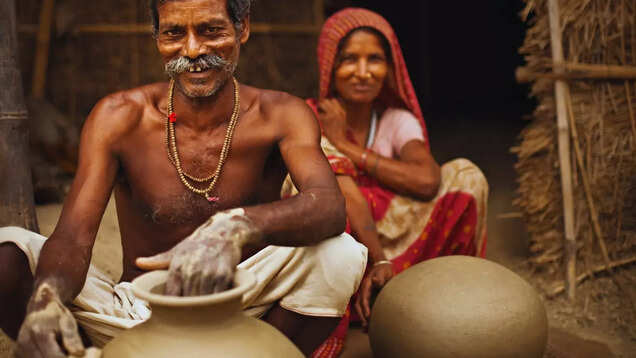
- Sustainable travel: With the global focus on sustainability, travellers are becoming more conscious of their environmental and social impact. With rural tourism comes sustainable travel, eco-friendly practices, supporting local economies, and preserving cultural heritage.
- Government initiatives: The Indian government has recognized the potential of rural tourism and launched various initiatives to promote it. Schemes like the Swadesh Darshan Scheme and initiatives by the Ministry of Tourism aim to develop infrastructure, improve accessibility, and promote lesser-known rural destinations.

- Majuli, Assam: Majuli, the world's largest river island, is a cultural hotspot in Assam. Known for its vibrant festivals, traditional Satras (monasteries), and unique Mishing tribal culture, Majuli offers an authentic rural experience. Visitors can explore the island's lush green landscapes, engage in pottery-making workshops, and participate in the Raas Leela festival, which showcases traditional Assamese dance and drama. Majuli is also a hub for sustainable tourism initiatives. Efforts are being made to protect the island from erosion, promote organic farming, and preserve the region's biodiversity.
- Khonoma, Nagaland: Khonoma, known as the first "Green Village" of India, is a shining example of how sustainable practices can be integrated into rural tourism. This village in Nagaland is home to the Angami tribe and is famous for its terrace farming, lush forests, and rich cultural heritage. Khonoma offers opportunities for voluntourism, where travellers can assist in community projects such as sustainable agriculture and forest conservation among many others.This not only enriches the travel experience but also contributes to the village's development.
- Pipili, Odisha: Pipili, a small village in Odisha, is renowned for its intricate applique work, a traditional craft that has been passed down through generations. The village is a living museum of colourful textiles, with artisans creating vibrant wall hangings, umbrellas, and garments. Visitors can participate in workshops to learn the art of applique and gain insights into the village's cultural significance. By supporting local artisans and purchasing their products, travellers help preserve this traditional craft and contribute to the economic sustainability of the community.
- Kutch, Gujarat: Kutch is known for its rich cultural heritage, including the Rann Utsav, a festival that celebrates the region's arts, crafts, music, and dance. Travellers can stay in traditional Bhunga huts, interact with local artisans, and explore the unique ecosystem of the Great Rann of Kutch.
- Ziro Valley, Arunachal Pradesh: Ziro Valley, a picturesque destination in Arunachal Pradesh, is home to the Apatani tribe and offers a serene escape into nature. Travellers can experience the Apatani way of life, including their unique agricultural practices and vibrant festivals like the Ziro Music Festival. Ziro Valley is a model of sustainable living, with the Apatani tribe practising eco-friendly farming and forest conservation.
- Pochampally, Telangana: Pochampally, often referred to as the "Silk City of India," is famous for its handwoven Ikat textiles. This village in Telangana offers an immersive experience into the world of traditional weaving, where visitors can witness the intricate process of Ikat weaving, from dyeing to weaving, and purchase exquisite handwoven sarees and fabrics. Pochampally's weaving practices are rooted in sustainability, using natural dyes and handlooms that minimise environmental impact. By supporting local weavers, travellers contribute to the preservation of this centuries-old craft.

Comments (0)

Refrain from posting comments that are obscene, defamatory or inflammatory, and do not indulge in personal attacks, name calling or inciting hatred against any community. Help us delete comments that do not follow these guidelines by marking them offensive . Let's work together to keep the conversation civil.
Comments ( ) Sort: Newest UpVoted Oldest Discussed Down Voted closecomments

SIGN IN WITH
Or post without registration.

Visual Stories
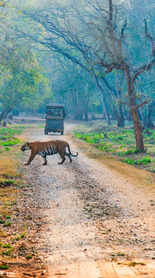
Popular Galleries

7 most beautiful meadows in Kashmir you must visit before the snow arrives

7 countries from your bucket list to avoid visiting right now TRAVEL TRENDS , WORLD

From traditional to quirky, these unique modes of transportation are worth travelling for TRAVEL TRENDS , WORLD
Trending stories.
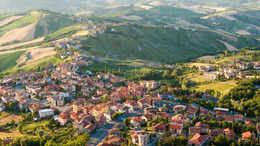
- 5 smallest countries in Europe for quick international getaways

- Visiting Mumbai during Ganesh Chaturthi? Don’t miss Lalbaugcha Raja

Top wildlife safaris for tiger spotting in September

10 unhappiest countries in the world

- Delhi to Dehradun in just 2.5 hours with new expressway opening soon
- 1 Rural tourism in India: The next big thing to look forward to
- 2 5 smallest countries in Europe for quick international getaways
- 3 Coolest reasons to not skip night markets when in Bangkok
- 4 Wonders of the Thar Desert: 5 must-visit attractions around the Great Indian Desert
- 5 Unbelievable places around the world that glow in the dark!

THE DEFINITIVE GUIDE TO DESTINATIONS, ITINERARIES, THINGS TO DO, RESTAURANTS, NIGHTLIFE and LOTS MORE!
FOLLOW US ON
Places to visit.
- Places to visit in Bangalore
- Places to visit in Mumbai
- Places to visit in Delhi
- Places to visit in Goa
- Hotels in Goa
- Hotels in Jaipur
- Hotels in Shimla
- Hotels in Mumbai
Things To do
- Things to do in Goa
- Things to do in Mumbai
- Things to do in Bangalore
- Things to do in Delhi
Travel Inspiration
- Visa on arrival for Indians
- Honeymoon Places in india
- Hill Stations in India
- Weekend getaways in Mumbai
- Weather in Delhi
- Weather in Chennai
- Weather in Bangalore
- Weather in Mumbai
Best Beaches
- Goa Beaches
- Mumbai Beaches
- Pondicherry Beaches
- Kerala Beaches
- Restaurants in Bangalore
- Restaurants in Chennai
- Restaurants in Pune
- Restaurants in Jaipur
- Hill Station near Delhi
- Winter trip to Ladakh
- Places to visit in Kerala
- Winter Honeymoon Destinations
- UK visa guide for Indians
- Winter Trip to Manali
- Vaishno Devi Yatra
- Special Train Ticket Booking
- HP inter-state Bus
- Honeymoon Destinations India
Latest News
Congratulations.
You have been successfully added to the mailing list of Times of India Travel. To complete the subscription process, kindly open your inbox and click on the confirmation link which has been emailed to you.
Share with friends
Thank You for sharing! Your friend will receive the article link on email mentioned.
- (For more than one recipient, type addresses separated by commas)

Rural tourism in India is emerging as a transformative force, offering authentic and immersive experiences. It provides travellers with opportunities to connect with local cultures, traditions, and na...

- UPSC History Notes
- UPSC Geography Notes
- UPSC Polity Notes
- UPSC Ethics Notes
- UPSC Economics Notes
- UPSC Science and Technology Notes
- UPSC Govt. Schemes Notes
- UPSC eligibility-criteria
- UPSC Syllabus
- UPSC Exam Pattern
- UPSC Admit Card
- UPSC Optional Subject
- UPSC Prelims Syllabus
- UPSC Main Exam Pattern
- UPSC prelims-2024-exam-pattern
Agritourism in India
Agritourism in India: Agritourism may be described as the convergence of tourism and agriculture. Agritourism in India involves inviting tourists to visit farms in rural areas or offering them stays on farms. This trend is gaining popularity, bringing benefits to both farmers and tourists. Agritourism is a type of commercial operation. It combines agricultural production and/or processing with tourism to attract tourists to a farm, ranch, or other agricultural venture for the goal of entertainment and education, and in return, it provides revenue to the owner of a farm or company. People appreciate learning about goods and procedures in which they will not be personally involved by having the tours on the sites.
Agritourism is becoming a significant tourist development opportunity for a country like India, as more people relocate to the city and lose touch with where their food is grown.
In this article, we will read about Agritourism in India, case studies on it, challenges and solutions, and the future of agritourism in India.
Table of Content
What is Agritourism?
Case studies on agritourism in india, challenges in agritourism in india, solutions for effective agritourism in india, the future of agritourism in india.
Agricultural tourism refers to a range of economic and social activities that occur in conjunction with travel and involve agricultural goods, services, and experiences. The Indian economy’s primary sector is agriculture. A little more than 65 percent of the population is reliant on agriculture. About 13% of the overall GDP is generated by the agricultural industry. Agriculture’s contribution to the national GDP would undoubtedly rise if more income-generating industries were added to the agricultural sector. Agritourism will do this. Agricultural tourism is a newer form of tourism that has grown in popularity in recent years. It allows guests to stay at fully operational farms to see the daily work routines and activities that occur in the agriculture industry.
1. Punjab: Farm Tourism
- Overview: Punjab, known as the “Granary of India,” has successfully integrated farm tourism. Tourists can experience life on a working farm, participate in farming activities, and enjoy traditional Punjabi cuisine.
- Success Factors: The success is attributed to the state’s robust agricultural practices, rich culture, and the warmth of Punjabi hospitality.
- Impact: This model has not only boosted tourism but also helped in showcasing sustainable farming practices.
2. Maharashtra: Agri Tourism Development Corporation (ATDC)
- Overview: ATDC in Maharashtra is a pioneer in promoting agritourism. It connects tourists with farm owners, offering experiences like fruit picking, bullock cart rides, and a rural lifestyle.
- Success Factors: The initiative’s success lies in its ability to provide an authentic rural experience while ensuring benefits to the local farming community.
- Impact: It has led to increased income for farmers and greater awareness about agriculture among urban visitors.
3. Kerala: Spice Plantation Tours
- Overview: Kerala’s spice plantations are popular agritourism spots. Tourists can walk through aromatic spice gardens, learn about spice cultivation, and purchase organic spices directly from the farms.
- Success Factors: The lush green landscapes and the opportunity to learn about organic spice farming attract tourists.
- Impact: This model has helped in preserving traditional farming methods and promoting the sale of organic spices.
4. Karnataka: Coorg Coffee Plantation Stays
- Overview: Coorg, known for its coffee plantations, offers unique stays where visitors can learn about coffee production, from picking to brewing.
- Success Factors: The serene beauty of coffee estates and the opportunity to understand coffee making are major attractions.
- Impact: This approach has helped in promoting local coffee brands and sustainable tourism.
5. Rajasthan: Dairy Farm Tourism
- Overview: In Rajasthan, some dairy farms have opened their doors to tourists, offering insights into dairy farming, animal care, and traditional Rajasthani rural life.
- Success Factors: The model thrives on the interest of visitors in rural lifestyles and traditional dairy farming techniques.
- Impact: It has provided an additional income stream for dairy farmers and enhanced the understanding of dairy production among tourists.
There are a number of challenges that are faced while increasing agritourism:
- Many farmers and rural communities are not aware of the potential benefits of agritourism.
- Inadequate infrastructure and poor accessibility to rural areas can deter tourists.
- Farmers and rural communities often lack the skills needed to manage tourism activities.
- Complex regulations and bureaucratic procedures can be a barrier for small-scale farmers.
- Ensuring consistent quality and standards in services offered can be challenging.
- Balancing tourism activities with the sustainability of the agricultural ecosystem is vital.
The solutions to increase agritourism development are as follows:
- Collaboration between the government, private sector, and local communities can lead to more effective development and marketing of agritourism.
- Involving local communities in decision-making ensures that agritourism development benefits them and respects local culture and traditions.
- Offering a variety of activities, from farm work to cultural experiences, can attract a broader range of tourists.
- Utilizing technology for bookings, virtual tours, and marketing can enhance the reach and efficiency of agritourism ventures.
- Creating networks among agritourism providers can facilitate knowledge sharing and collaborative marketing efforts.
According to the 2019 Business Economics study, India’s agritourism industry is seeing a 20% annual growth rate. The market for agritourism was estimated to be worth $42.46 billion globally in 2019 and is anticipated to grow to $62.98 billion by 2027, with a CAGR of 13.4% between 2020 and 2027. In India, agritourism revenue is increasing at a pace of 20% annually.
- The Educational Benefits of Agritourism: Agritourism may increase urban schoolchildren’s awareness of rural life and knowledge of agriculture science. It is the finest substitute for urban-based school picnics. It gives urban college students the chance to gain practical experience in agriculture. It is a method of educating aspiring farmers. It would be a useful tool for teaching and training agricultural and line department officers. This offers a special chance for education through enjoyment, where learning is enjoyable, efficient, and simple. Doing is learning, and seeing is believing.
- Desire for Serenity and Peace: Diversified thinking and activities are products of modern existence. Each person makes an effort to work harder in a variety of ways to earn more money and enjoy modern amenities. Peace is therefore never in his system. It is possible to find a quiet environment through tourism. Due to its location distant from cities and close to nature, agritourism naturally fosters calm and peace.
- A desire to learn more about the farming sector and way of Life: The urban population has long been curious about learning about food supplies, plants, animals, raw materials like wood, handicrafts, languages, culture, tradition, clothes, and rural lifestyles because many of them have roots in villages. This population segment’s curiosity can be sated by agritourism, which centers on farmers, villages, and agriculture.
- An Affordable Entrance: In agritourism, lodging, meals, entertainment, and travel costs are the lowest. The tourism base is widened by this. With only a tiny percentage of the population being urban and wealthy, the current concept of travel and tourism is restricted to these groups. However, the idea of agritourism expands the reach of travel and tourism to a greater populace due to its affordability.
- Health-Conscious Suburbanites Seek Solace in Environmentally Responsible Activities: Life has become more stressful due to the modern lifestyle, and lifespans have decreased. As a result, individuals are always looking for natural ways to improve their quality of life. Villages are the origin of the pro-nature medical system known as Ayurveda. Villagers’ traditional medical knowledge is valued. Urban areas and overseas nations have more demand for organic foods. Overall, the urban population that is concerned about their health is going to the countryside for solutions.
- High Demand for Family-Friendly, Healthy Recreational Activities: Villages offer more affordable recreational possibilities to people of all ages—children, teenagers, adults, and seniors—as well as to the entire family. The entire family may enjoy a variety of amusement thanks to rural games, festivals, food, clothing, and nature.
- An Interest in the Outdoors: The population of busy cities is gravitating toward nature. Because a natural setting is constantly removed from a hurried existence. Birds, animals, crops, mountains, water bodies, and villages offer urban residents a completely distinct environment where they can escape the hustle and bustle of city life.
- Unhappiness with Crowded Cities and Resorts: Overcrowded peacemakers upset each other’s peace in cities and resorts. Peace therefore extends outside of cities and resorts. Despite efforts to establish a village ambiance in the suburbs through resorts and farm cottages, it appears to be a pale imitation of the original.
- Nostalgia for their Rural Beginnings: Villages are disappearing as cities expand. Those from rural areas are moving to urban areas in quest of employment and the conveniences of contemporary living. As a result, today’s suburbanites were yesterday’s villagers. Urban dwellers harbor a deep love and respect for their ancestral homes and rural communities. Visits to communities so fulfill their goal. This is also demonstrated by suburbanites’ enmity towards rural areas outside of cities and their enthusiasm for farms. Any suburbanite’s goal is to travel to rural areas and spend time with family. However, having even basic amenities might be problematic. Agritourism makes an effort to solve this issue.
- Rural Leisure: Through festivals and handicrafts, villages provide suburbanites a variety of recreational opportunities. Villagers’ or we can say the farmers, manner of life, garb, dialects, and cultures/traditions are always valuable additions to the entertainment. Curiosity among urban educators may be sparked by the agricultural environment surrounding farmers and the complete production process. Places of agricultural significance, such as the highest crop and animal yielding farms, processing facilities, and farms where innovations are being tested, draw tourists. Agriculture-related goods including processed foods, organic food, and farm-gate fresh markets may entice urban travelers. The agri-atmosphere in the villages creates opportunities for the development of agri-tourist goods including agrishopping, gastronomic tourism, pick-and-own-your-tree, rural games, and health (Ayurveda) tourism.
Related Articles: Agriculture and Food Security Role of Agriculture in Indian Economy Agricultural Practices – Planting, Irrigation, Weeding Factors Affecting Agriculture In India Indian Agriculture after the Green Revolution
Conclusion – Agritourism in India
Agritourism offers a unique chance to integrate components of the tourism and agricultural sectors to give travelers, farmers, and communities with a variety of financial, educational, and social benefits. Agritourism provides producers with an extra source of income as well as a channel for direct marketing to consumers. It boosts the tourist business by boosting the number of visitors and the length of their stay in a certain location. Agritourism has the ability to improve local tax bases and create new job possibilities for communities. Agritourism also gives public educational opportunities, aids in the preservation of agricultural areas, and allows states to build corporate businesses. Agritourism offers visitors ‘rural experiences,’ with the purpose of providing a source of income for farmers and communities in the surrounding area. The introduction and marketing of community-based agritourism goods would be beneficial to the industry’s inclusive growth.
FAQs on Agritourism in India
1. what is agritourism and how is it developing in india.
Agritourism in India involves bringing tourists to rural farmlands or providing them with farm stays. This concept is gaining popularity, especially in states like Maharashtra, Karnataka, Kerala, and Punjab, showcasing the growing trend of exploring and experiencing rural life.
2. What are the Benefits of Agritourism for Tourists and Farmers?
Agritourism offers advantages to both tourists and farmers. Tourists get to enjoy authentic rural experiences, while farmers gain an additional source of income. This mutually beneficial arrangement contributes to a more sustainable and diversified economy.
3. Which are the Popular Agritourism Destinations in India?
Some of the highly recommended agritourism destinations in India include farmstays in Maharashtra’s Sindhudurg district. These locations provide tourists with an opportunity to immerse themselves in the rural lifestyle and enjoy the natural beauty of the surroundings.
4. How Does Agritourism Contribute to Rural Development in India?
Agritourism plays a significant role in rural development by supporting local economies. It provides farmers with a supplemental income, boosts employment in rural areas, and encourages sustainable agricultural practices. The influx of tourists contributes to the overall growth and development of these regions.
5. What Activities Can Tourists Expect in an Agritourism Experience in India?
Agritourism experiences in India offer a variety of activities for tourists. Visitors can engage in farm work, participate in local cuisine tastings, and immerse themselves in cultural experiences. This diverse range of activities ensures an enriching and memorable experience for those seeking a connection to rural life.

Please Login to comment...
Similar reads.
- Discord Emojis List 2024: Copy and Paste
- Best Adblockers for Twitch TV: Enjoy Ad-Free Streaming in 2024
- PS4 vs. PS5: Which PlayStation Should You Buy in 2024?
- Best Mobile Game Controllers in 2024: Top Picks for iPhone and Android
- 15 Most Important Aptitude Topics For Placements [2024]
Improve your Coding Skills with Practice
What kind of Experience do you want to share?
- Destination
- Enjoy Top Vibrant Festivals Of Vijayawada One Should Not Miss
Enjoy Top 5 Vibrant Festivals Of Vijayawada One Should Not Miss
Vijayawada, nestled on the banks of krishna river, is a lively city in andhra pradesh that's steeped in cultural heritage. the residents celebrate a plethora of cultural events, placing onto display the historical richness and sense of community that's vibrant and appealing. the city has a blend of age-old celebrations and contemporary activities, providing a versatile cultural tour for both inhabitants and visitors..

Ishika Jain Updated: Sep 05, 2024 9:00 PM IST
Vijayawada is a bustling city that lies on the banks of Krishna River in Andhra Pradesh, which is famed for being a vibrant cultural center. Known for its historical significance and rich traditions, the city celebrates various cultural festivals that give an in-depth understanding of its heritage and community spirit. So many are the cultural events that happen in Vijayawada but here is a list of some of them:
1. Krishna Pushkaralu
Krishna Pushkaralu is one such major festival which comes once every 12 years near Krishna River banks. This occasion serves as a tribute to the sanctity of this particular river and therefore involves millions of devotees from across India who make a pilgrimage to this place. They come to bathe in the holy river, perform rituals, attend prayers and worship ceremonies and engage in numerous other acts associated with religion or custom. The event overflows with music, dance and devotion making it mandatory for anybody coming to Vijayawada at this time.
2. Sankranti

Makar Sankranti , commonly called Sankranti, is among the most popular festivals celebrated by individuals who live in AP's capital; Vijayawada . It marks harvest time hence it is celebrated with great pomp and joy. These include kite flying, communal fireside meetings or performances among others which people performing traditional customs take part in during such functions. Family members also share special dishes like Pongal together on such occasions. All these goings-on result into an amazing sightseeing scenario due to hordes of colorful kites seen floating over Vijayawada's air.
In Vijayawada Dasara or Dussehra takes place mostly at Kanaka Durga temple which is one amongst the most popular temples in the city. This festival goes on for ten days culminating in the victory of good over evil. Pilgrims flock to this temple in order to pray and perform many other rituals as well. Lights, decorations and cultural programs are arranged all around the town to mark the occasion. The sight of the deity being carried through Vijayawada's streets is awe-inspiring.

Ugadi is one of those events which have become very popular in Vijayawada due to Telugu speakers. This festival gives New Year's Day feelings and also allows people to eat a lot with their loved ones during this time. As an example, the Ugadi Pachadi meal stands for life's diverse experiences while being cooked and taken by people at such times so as to symbolize different tastes for that occasion only. Owing to some mango leaves hanging from doorways out front as well as rangoli designs can be seen here or there, homes seem more lively when decorated like this . These programs include music concerts, dance performances and a few other art activities that mirror various cultures found in the vicinity.
5. Deepavali
Deepavali is a local name given to Diwali because it is celebrated extensively here too which means festival of lights held annually with great excitement in Vijayawada city where thousands of lamps illuminate every corner of this place at night fall while fireworks fill sky above it letting everybody enjoy beauty of these shimmering ignited objects originating ground level or higher up into atmosphere depending upon what kind they are . Families come together for religious worship before eating sweet dishes containing ghee and exchanging presents between themselves besides buying goods from vendors who arrange stalls along brightly lit streets across town; turning everything into festive moods . Deepavali puts together ancient traditions alongside contemporary celebrations making all feel jovial.
With its rich multicultural fabric, Vijayawada has something for everyone, with festivals that reflect her traditions and the spirit of her people. Each festival gives a clear picture on the rich cultural life of the city through its own unique customs and festivities. Whether you are a local or a visitor, these festivals help you to connect to Vijayawada's cultural soul.
- Topics News">Vijayawada
- Topics News">Vijayawada Tourism
- Topics News">Vijayawada Tourist Places
- Topics News">Vijayawada Travel Diaries

IMAGES
VIDEO
COMMENTS
PRAKRITI Farm, Majra, Rup Nagar, Punjab, +91 099713 93626. Dudhsagar Plantation. It is situated at the foothills of the Western Ghat Mountains in serene South Goa. The farm was set up in 1985 and contains a huge variety of organic fruit trees, medicinal plants, spices, herbs and flowers.
Tathagata Farm, Darjeeling, West Bengal. Tathagata Farm. Tantalizing Tathagata Farm offers an opportunity to get back to nature on a tea estate up in the hills, 45 minutes from Darjeeling. In addition to tea, the farm grows cardamom, ginger, vegetables, oranges and other crops.
Whereas the Indian tourism industry is growing at 10.1 per cent which is 2.5 times more than the world rate. The tourism sector is one of the major foreign exchange earners for the country. Agri-tourism is one such form of tourism which has recently emerged in Maharashtra. It is a field with the potential to develop.
Agriculture tourism is a unique way to experience rural India. Agrotourism is the practice of bringing tourists or other visitors to a farm. It is a chance for tourists or other visitors to experience agriculture up close and personally. Due to its many advantages, the idea of agro-rural tourism has grown over time in India and even around the ...
Nisarg Sangit Agrotourism, in Morgaon, Maharashtra, is a favorite spot in India for loads of activities like bullock cart rides, farm experiences, Fishing point and able to see traditional farming equipments. In this agro tourism, visitors will explore different types of farms including Goat farms, poultry farms and organic farms.
Explore the world of agritourism in India, connecting farmers and tourists for a unique rural experience.
Escape the city and experience authentic India! Explore farm stays in Kerala, Punjab, Haryana, Nagaland, Sikkim & Karnataka. Enjoy organic food, cultural activities & nature walks.
Agro-tourism, a lesser-known category within agriculture, is gaining momentum as people seek a slower pace of living and connection with rural areas. Farmers offer accommodation and curated experiences, benefiting both tourists and farmers. Eashani Chettri Updated 1 June, 2023 12:58 PM IST. Agritourism is becoming increasingly popular in India.
Source: traveldiary. Agricultural tourism involves visitors partaking in farming-related activities, engaging themselves in rural life, and relishing agricultural events. This distinct kind of tourism has grown in popularity in India because of its potential to provide tourists with an immersive and informative experience while also contributing to the economic development of rural areas.
Agro Tourism Destination in India. Mathura, Uttar Pradesh, India ( A Village Near Vrindavan ) Few Heartwarming Activities as an Agro Tourist. As an agri-tourist, you get to live the life of a villager like milking the cow in the early morning, ploughing the fields, taking bath in the well or river, climb a tree and pluck fruits directly from it ...
07. Dewalokam Farmstay Retreat, Karimannoor, Kerala. Another pretty farmstay in Kerala, Dewalokam is around 90 minutes drive from Kochi airport. Guests here can relish a wide variety of farm fresh ...
85% of India's population is directly or indirectly dependent on agriculture and allied activities. [7] ... The 'Green Farm' project launched by the Government of Kerala is aimed at promoting agro-tourism in Kerala. [9] Apart from Kerala and Maharashtra, Nagaland and Sikkim are also successful agri-tourism states. [10]
The global agri-tourism market achieved a valuation of $42.46 billion in 2019 and is anticipated to attain $62.98 billion by 2027, exhibiting a compound annual growth rate (CAGR) of 13.4 per cent ...
Aambaban is an Agro Tourism Resort located at distance of 45 mins from Pune. Spared over 22 acres of huge farmland, surrounded by Mountains, River, Farms & Beautiful views. An exotic holiday destination near pune, just 45 km from Pune A perfect blend of Agri and Rural Tourism. Agri Tourism in India, Agri Tourism in Maharashtra, Agri Tourism in ...
Why is Agro Tourism popular in India? Agro tourism's popularity in India can be attributed to its rich rural heritage, diverse agricultural practices, and authentic cultural experiences. With over 60% of the population dependent on agriculture, India naturally becomes an appealing destination for agriculture tourism.
resources. India, recognized among the top 10 tourist destinations by Conde Nast Traveler, can enhance its tourism industry with the introduction of agritourism, further boosting its global competitiveness. In India, agritourism is becoming increasingly popular as a way to experience farming practices and rural life.
of a destination, and all other characteristics of a destination's way of life (McIntosh and Goeldner, 1990). Fig a. ... with proper government incubation it can gain flight. There by introducing agro tourism concept all over India not only the present growth rate can be sustained but it is also a value addition and can accelerate further ...
Benefits of Agriculture Tourism for the farmers: There would be a chance for the farmers to expand the operations of farming. There would be an increase in the revenues of the farm. There would be development in the consumer markets and as a result, employment increases.
Yashodhan Agri Tourism is the right place to spend your next vacation. Whether you are a Maharashtrian or from any state in India, our agro-tourism resort in Narayangao, Junnar has a plethora of experiences that promise to leave you spellbound. Guests are attracted to our beautiful resort from all corners of the country, for it is nature ...
visitors, can be seen as a secondary and stable source of income for the farmers. Also, India is counted amongst the top 10 tourist destinations in the world (Conde Nast Traveller "A leading European Travel Magazine). It serves as a home for the diverse culture and agro-climatic conditions, providing scope for the growth of this business.
The agro-tourism concept began to gain popularity as a result of the federation's efforts in both areas, particularly in promoting the concept in urban areas and providing training to farmers regarding agro-tourism. Agro-tourism center registered under organization. The first state in India to introduce agro tourism was Maharashtra.
That is why; agro-tourism, eco-tourism and rural tourism are emerging as key sectors of tourism business in India. Most of the studies have proved the due importance and need of agro tourism on the following basis: · Agro-tourism is a sustainable form of tourism business. · It provides an additional source of income for the farmers.
Rural tourism in India is poised to become a major component of the country's travel industry. As more travellers seek out authentic, sustainable, and immersive experiences, rural destinations ...
According to the 2019 Business Economics study, India's agritourism industry is seeing a 20% annual growth rate. The market for agritourism was estimated to be worth $42.46 billion globally in 2019 and is anticipated to grow to $62.98 billion by 2027, with a CAGR of 13.4% between 2020 and 2027. In India, agritourism revenue is increasing at a ...
Vijayawada is a bustling city that lies on the banks of Krishna River in Andhra Pradesh, which is famed for being a vibrant cultural center. Known for its historical significance and rich traditions, the city celebrates various cultural festivals that give an in-depth understanding of its heritage and community spirit.